#but it does crucially lack romance elements
Text
Still enjoying Baldur's Gate 3. My spouse is interested in the game too, though I think it's unlikely that he'll be able to get into it. He doesn't have much experience with turn based tactical games, and I think that ultimately the high level of complexity in BG3 is going to be a barrier to entry.
I can't even advise him to play an easy character like a fighter because you have to control every action taken by every member of your squad. Sometimes he watches me during combat and whenever I open up the action wheel and scroll through literally dozens of choices he's like "...this looks really complicated".
He loves Dragon Age, but honestly that series is far simpler to get into. It does have a lot of granularity in its tactical options, but you can also just choose to lower the difficulty and let the AI control your teammates and you can do just fine.
#honestly if I did not already have some experience with D&D 5e I think this game would be too complex for me#I think a better game to get him into turn based tactics would be X Com Enemy Unknown#he's more into sci fi than fantasy anyway and I think he'd love the base management aspect#but it does crucially lack romance elements#at least outside of my fevered imagination#video games#Dare Original
56 notes
·
View notes
Text
Spy x Family Code: White - Highlights
*This post contains spoilers. Scroll away if you still need to watch the movie.
**Reposted because it didn't show in the tags.
Since the movie is out and has been circulating on the internet, I would like to talk one thing or two about it. I'm overjoyed about the release and have watched the movie numerous times. So here are some highlighted scenes, or at least the ones that have become my favorites and lingered in my mind for way too long.
━━━━━━━━━━━━━━━━━━━━━━━━━
First off, this scene. It's just a small gesture of Loid because apparently he's worried about Yor's mouth due to the "irritating" lipstick she's wearing.
But tell me, what kind of man would give a woman such a pleasant little gift if he did NOT love her. It's not like, "You're nothing to me. Here's a new lipstick for you!"
Loid is not going to declare "I LOVE YOU" explicitly; the hell is he going to, but we have eyes, and we see. Your small gesture and little gift say everything I need to hear, and I won't take your for the mission excuse anymore, Loid Forger.




━━━━━━━━━━━━━━━━━━━━━━━━━
I'm fully aware that the "Yor getting jealous" trope is becoming redundant nowadays. Some people say they're overdoing it and no longer find it interesting to talk about. But I beg to differ. I'm still on the Yor's jealousy bandwagon because it's become a crucial element in her and Loid's relationship. Yor does not necessarily have the right to get jealous and upset about the idea that there is someone else in Loid's heart. Heck, I dare say she can't pull out the "wifey" card because we know it's all fake.
But that's not that.
For me, to say that Yor is jealous there might be another woman in Loid's life is an understatement. It's not to say she is being greedy, but she does want Loid, and only him, not just because she's technically his wife—her genuine feelings for him are growing, and we can see that. She does not want to lose him, let alone to be out of the picture. It's Yor being true to herself. It's Yor fighting for her love and affection for Loid.




Extras:
Yor's heart is already shaken at the possibility of Loid cheating. And HE does not help by throwing such flattery and complimentary comments about his wife. This dense man…


━━━━━━━━━━━━━━━━━━━━━━━━━
I liked what Anya did in this scene.
Afraid of her family falling apart, she tried everything she could to prevent that, and that is... through her parents' flirting 😏
She's still a little kiddo, but being the telepath that she is, she still wants her family to stay intact. Anya pushing Loid and Yor together to have some kissy-kissy time never gets old, to be honest. I always enjoy it every time she does that. Anya recollecting what Becky said about divorce and the "supposedly" bloodbath also added some comedic sense to the scene.




━━━━━━━━━━━━━━━━━━━━━━━━━
This has got to be my #1 favorite.
The only physical intimacy in this scene is just Loid putting his hand on top of Yor's. Nothing more. Okay, we may have moved past that episode where LoidTwilight pulled a honeytrap on Yor, AND we can't dismiss the fact that maybe, there's a definite chance that he just used her.
But this time, he is determined to keep Yor around for real. He even restated his granade proposal to stick with each other—basically their wedding vows—and had no intention to break that promise. What's this smell? It's a whiff of peak romance.
━━━━━━━━━━━━━━━━━━━━━━━━━
This scene made me feel warm and fuzzy.
What came to my mind when I was watching this scene was that although Twilight is the best and most renowned spy there is, he's still lacking some things. One of them is, for sure, parenting, which we saw from the earlier episodes of the series, he picked it up from books.
Yor always plays along with Anya to keep her entertained, and it's also one of her ways of parenting that some people may have dismissed. Yor arguably does better in this field than Twilight from her own experiences, the big chunks of which were from when she raised little Yuri. This should eliminate the questionable discourse of Yor "unfitting" for the mother role.




This scene got extended to when Yor told Loid that it was a family trip, that Anya was looking forward to this trip, and that they all should go together.
━━━━━━━━━━━━━━━━━━━━━━━━━
This may be the last for now: the Forgers walking hand in hand at the end.
I couldn't imagine the hardships this family went through throughout this movie. (Ok, I know some were absurd, but let's move past them for the sake of this post.) Despite being a fake family, they still came as one and worked hard together to put things back in their place and resolve all the problems. Like... they didn't have to do that; their family is a pretend. But they did. They're complete, and it's so beautiful to see ❤




#spy x family#loid forger#yor forger#anya forger#bond forger#twiyor#loidyor#code white#sxf code white#sxf spoilers#sxf
135 notes
·
View notes
Note
TW: trauma, and others.
"When an MC drinks the blood of a Gifted, they become connected to their heart, mind, and soul. They may feel past sensations, experience current emotions, or become foreign in their own skin."
After reading this from an anon's romance-centric ask, I suddenly have terrible ideas.
Just imagine MC experiencing the following:
Drinking blood from a dying/suddenly killed Gifted
How about blood from a badly tortured Gifted?
Then there's blood drinking from some psycho Gifted with zero remorse for the inhumane crimes (up to your imagination) they committed
Bruh. The side effects alone can either make the MC more intimate with their ROs or traumatized to the point that they might be averse to drinking Gifted blood. 👀
You've considered this as well, right? Will this be tackled on the story? How deep the darkness goes?
Extra: If you've got some ideas and time, how would ROs (minor and main) deal with a gentle, caring MC who was shaken and pitifully terrified after experiencing any of the scenarios?
(;´∀`) Yes, when it comes to blood drinking, certain dark elements may be touched upon depending on one's choices, particularly in relation to trauma from other characters. Hence, uh, an aversion to blood drinking is certainly a possible option for the MC. Their experience with Elov in adolescence will inform them of this risk.
It’s also not as though their mother, who shared the same gift, didn’t struggle with the very same ‘costs’. The MC’s father has deep (and occasionally silenced) reservations against the MC developing a dependence on their gift due to the toll he witnessed on their mother.
I will say that Mockingbird should have an awareness towards certain individuals offering a higher risk of these unsavory linked experienced when drunken from. Drinking from characters such as Retriever, Imka, and Lempo would have a much lower (though a non-zero) risk of scarring mental or physical experiences compared to, say, Dearil, Bones, or Fyodor. Not that those characters lack past horrible experiences / prevailing issues in the present, but there are notable differences in their states of emotional healing and mental fixations (as well as the side effects of their gifts) which would influence Mockingbird's experience with their blood.
Onto the (considerably generalized) scenarios . . .
. . . with a general assumption / vibe(?) of an already established relationship for some, most, maybe? I don’t know it’s all loose. ʅ(´◔౪◔)ʃ
Main ROs
Akil
"It is not your fault.”
For someone with a heart so kind, with care even for those who deserve none, he says what should be known. His voice remains even. Enunciated, clear. On the surface, he is the pinnacle of reliable calm.
“You are not the cause of their pain. This is theirs to bear, not yours.”
He reassures with inarguable truth.
“It is a phantom pain. Breathe, please."
He tries to guide the pace of your breaths with his own. Sorrow cuts through him, but it does not surface.
If possible, he will order for the source of your blood, the one who acts as the origin for this translated pain you carry, to be tended to. That is where this pain is most tangible, most addressable. He cares not for who or what they might be—Cardinal or Hawk, innocent or vile—so long as the easement of their suffering reaches you.
But he knows that the mercy of your heart will cling to the miserable knowledge that such a pain like this exists at all in another. Physically inflicted, mentally imbedded, emotionally ingrained. Fleeting or constant. Dull or sharp.
He knows that the most crucial moments in helping you has yet to come. The hours and days after this shock are when he must become vigilant against the scars that can form, scars not as simple to address as those on skin.
He will be there for counsel, for support, however you require. He will be there to guide you through this darkness. He will do all he can to preserve what innocence remains from a trial as horrendous as this.
Kamiko
She calls your name in a tentative whisper. Her entire body seems to ache for a nearness to you, yet she does not close the gap of space between.
A gloved hands hovers above your cheek, her dark brown eyes searching for a sign that it is okay to touch you in this moment. A sign that her presence in this moment is accepted.
More than anything, she hopes for her presence—her support in this moment—to be wanted.
To be useless to you here, now . . . She could not forgive herself if that were the case.
She finds herself unable to ask of you what she would demand from herself. To bury this, to swallow any pity or fear in exchange for cold indifference. But you have a heart that bleeds. A heart that takes in everything—everyone—with such depth and grace. It feels acutely, intensely. Even for someone like her, human and unworthy of you, you feel her love and pain as though it were your own.
She loves your heart more than anything, but it is at times like this she cannot help but dread its vulnerable nature.
How can she ever hope to protect you from yourself; this sensitivity that defines the one she loves.
"You . . ."
Her voice sounds strange to her own ears. Weak, afraid. Protocol for this moment runs through her head. She knows what she is supposed to do. The routine, the procedure, the manual that lacks the human quality of this ache that is witnessing your pain.
". . . Please, tell me how to help you."
Sigmund
“I’m here. I’m here for you.”
Worry seeps in against his will, yet he curses at how hollow a comfort his words are.
He wants to wrap you in his arms. To anchor you with his heart. If he could only ground you with a touch, or a wisely spoken word— but his uses are limited, and the fault of your pain lies on him for not being enough to keep you from the blood and its toll.
“Songbird, Herz,” he tries again as his hand reaches for your cheek, a slow and visible reach as to not frighten you more, “Look at me.”
Your fear is tangible in the grit of your teeth, the vague tremble beneath your skin.
"Focus on me." It is as gentle a command as any man could ever give. His hand lowers to rest beneath your chin, urging your gaze to meet his as delicately as he possibly can. It is your delicacy that frightens him. It is your pain that hurts him more than anything else ever could.
Actions will always mean far more than words. Words are weak, quick to fail, and never seem to do what needs to be done.
If his love allows, he will (take you into his arms / guide you away from here with his strength as support) his hands squeezing for a moment - gentle and firm - as though to say, 'I am here, and beside you is where I will forever remain.'
He moves without thinking, a sole purpose guiding him forward. To take you somewhere safe. Quiet and calm, where you can scream or cry, laugh or rest, tremble or cling to him without fear of harm from the eyes and hands that have led you to this pain.
And if there is no quiet and calm to be found, no haven to steal you away into . . . then he will have to make such a refuge. Those who stand in his way will not be met with any hint of mercy.
Imka
"It's not right."
The feeble plea to the world falls past her trembling lips. Her hands seem to bear the most of her overwhelming sorrow as they reach for your own, caress your own, before making a panicked and tender journey to cusp your tortured expression. Her fingers stretch across your cheeks, worried at the thought of tears staining the face she loves.
"You don't deserve—Your gift shouldn't have to hurt you like this. It's not right."
She wishes she could take you away from here. She wishes she could take you somewhere where you never need to think of this pain again, where you can heal and rest and forget.
A place where you never crave for this agony, and never need to forsake yourself to it. This blood . . .
“I’m sorry,” coats her every shallow breath. She does not know whether she should hug you with all her might or pry herself from you so you might find your own breath again.
“It’s my fault. I’m sorry,” she whispers to you, to no one, as though these words held the power to transfer all your anguish onto her. If only she had a stronger gift, a less painful life, for your sake alone.
In the days and nights that follow, she seems lost, her hesitant smiles and cautious touches all distracted by the unshakable memories of your pain. She searches for an opening to approach the subject, scared to reopen this emotional wound when you are not ready or willing, but finds her attempts to speak comforts weak. Yet she does not for a moment give you doubt that she is here for you to lean on, a willing and loving presence that will listen to everything that needs to be said and will stand patiently beside you through all that cannot be spoken.
Elouan
His hand has yet to release your own, his bared touch offering a small presence of light and warmth. A string of curses flow beneath his breath, breaking now and then when he brings your hand to his lips to kiss, their soft texture pressed against your skin with an almost desperate touch.
“Curse them,” he mutters bitterly, blue eyes focused on nowhere and burning with a victimless rage, “For every ounce of pain ever felt or caused, curse us all. Mon amor, you have me going mad, helplessly mad. Here I sit useless, wishing for utopias and condemning victims just so you never have to feel this again.”
His sarcastic grin falters beneath unswallowable concern, his facade of control crumbling beneath your every shaken breath. He kisses your hand again, eyes fluttering closed as if to hide from the sight of your hurt, before summoning a weak smile once again.
“You are too good for us. You should not be made to bear our evils like this. Not mine, not theirs, none but your own—and, my love, you have no evils. Only pain inflicted by others, taken with such selfless grace that I fear I love a saint.”
It terrifies him. There is not a day that passes where he does not fear for the purity of your heart, a trait that once aggravated him to no end.
The blood is too tainted. His own blood especially—strawberries, rich and too sweet, you now attested it to be—had always proved itself far too foul for your lips, too ruined to ever be an offering to you. If he had been a better man before you met, he would have been worthy of you now. This truth is one he will forever regret.
"But you are alive, at least. You are alive and that is all a man as selfish as I can ask for. Live another day with me, ange, and I will do all I can to ease your pain."
Jae
"You'll make it," she chants breathlessly for the umpteenth time, the mantra affirmed more like a threat against the world for what would happen if you did not.
"Stay with me." Her arm secures itself around your hips, pulling you tighter against her, pressing you together as if she could physically transfer her strength to you by doing so. "Birdie, eyes on me. Please, fuck, please look at me."
The blood coils around her fingers, filthy crimson strings that she draws from your lips like it were poison. Fuck, that's exactly what it is.
Poison. Something so against your nature that she worries it is killing you ever so slowly with each drink. Something that takes from the light in your eyes, the gentleness of your touch. Something that takes and gives nothing but rot.
She summons what she can from your teeth, your tongue, any trace that might further trigger your gift with its taste. The blood obeys. It glides seamlessly from your opened lips to her tense hold.
She sneers at its presence.
When the last drop is lured from your lips, she casts it away somewhere far and unseen. Its stain should not remain anywhere near you, her pure-hearted love.
"It's gone. It's over," she promises, though she knows the memories of this will be scarred on you for countless nights to come. A rage burns within her at the thought of this truth.
Rage towards the CARDINALS, the HAWKS, the source of your blood, and the source of the pain you felt. To turn your own gift into a weapon against you, to twist the beauty of it in this way . . .
She forces a smile over the acidic fury that boils within her. A smile for you and you alone, hoping to inspire one of your own.
Hoping to help you leave this time in the past, buried and forgotten beneath whatever may come tomorrow.
"Leave here with me, please."
Niccolò
“It will end. You are you, and no one else. This pain is not meant to be kept.”
There is a soft gravity with which he speaks, his words as delicate as the touch he offers to your arms. His fingers brush against you in hopeful want for an invitation to hold you.
Despite your panic, your agony and grief carved so harshly and wrongly onto your being, the smile he shares is sincere. Small, and uncertain, but it is a smile born from an endearment towards all that you are, even the sides of you that are frightened, shaken, or slowly being lost to a gift you cannot tame.
“They are a sickness to you," he states as though it were the most blatant truth, a firmness mixing into his warm tone, "But you are resilient, and you will heal. I promise you, cuore mio, that I will not rest until you are comfortable with yourself again.”
And he knows that time will come again. The time will come for you to smile again, laugh again, just as you will inevitably cry and shake and break at the hands of this gift you cannot contain.
Mutya
“Dammit!”
Her voice pierces through the haze around you, forcing her to the front of the world that is your muddled thoughts.
Her hands are quick to follow—desperate, grabbing, caressing, only to retreat into curled fists that punch down onto her thighs. She has kneeled beside you without a thought, practically collapsing into a heap of furious cries.
"Fuck, I can't - I can't let this happen to you!"
She wipes the blood from your lips with her hands—as if that could sever the bond and all its costs—and chokes on all the curses and blame that overwhelm her.
She doesn't know what to do. How to help. Her panic only endangers you both, her thoughts pressing against her skull with the ache of her fears wishing for life.
“Mahal,” she whispers above the splitting pain that rings in her ears, “I can’t lose you to this.”
She is harsher on herself in the days to come. Vigilant for any signs of your distress that lingers, the memory of this pain that haunts your wounded gentleness. She vows to never let someone allow you to be hurt like this again.
She vows to be all that you need to heal from whatever this gift threatens to scar upon you, to make you become.
Fyodor
"Why are you frightened, душа моя?"
This is not the response he had expected.
Mishka says the blood is good for you. Necessary, like how Mishka is to him. And just as blood is needed, so is the pain.
Only with the blood would you be free. With the blood, you would be content.
But this . . . this he cannot allow.
"You are too delicate for them,” he affirms as a truth that should have been so obvious is only now seen before his very eyes. “For us.”
He kneels beside you with the slow movements of one approaching a nervous animal. The focus of his gaze does not stray from red gloss that wrongly coats your lips; something akin to hurt, a muddled picture of remorse, only heightening the natural intensity behind the way he looked at you.
“Little heart,” he calls. Beckons, truly, for the brush of his hand against your cheek is his wordless plea for you to draw nearer to him. To want—to desire and cling to—his presence as he would yours. “Ask me to change our fate, and I will.”
He is impatient. He tilts your chin so your gaze might meet his, guides those lips colored by ruin so he can briefly capture them with his own. Chaste and soft is the gesture.
When he draws away, he tastes what remains of the cause for your pain.
Yes, in this moment, his patience is lost. For the Hawks that cannot protect you. For the Cardinals that have pushed you to drink this dirty blood.
The human eye cannot perceive what occurs next. There is a light, then darkness. A warmth that encompasses you entirely. A rumble reminiscent of thunder in its strength, leaving cracks within the earth.
In a moment, you are stolen away. Until it is safe, until the world has once again earned the privilege of your grace, he will keep you where no further harm can be done.
Minor ROs
Dearil
"It's an acquired taste," comes the low hum of his voice from above, his looming figure visible just from the corner of your eye. Crumpled to the floor, almost lifeless at his feet, you feel his gaze pressed upon you like a weight, cold and foreign as though you were strangers once again.
Dreadful are those seconds that pass, their silence broken by his crooked and false laughter.
“Don’t play cute, little bird. Even children are quick to learn that there are consequences to greed like this."
On one knee he kneels beside you. He does not make to reach for you, to hold you.
He simply studies you. The focus of his eye flits over the panic you wear, the blood that stains your lips—at any other time, such a sight would please him.
Instead, in the weariness of his features, you see . . . disappointment.
"You take and take, more and more without a thought, so helpless and innocent on the surface. You fret and worry over those around you like someone truly sweet of heart, endearing others with your pleasant grace, pretending like blood doesn't stick to your teeth behind those patient smiles . . . Songbird, you feed like a starved beast living its last days."
And there it is. The endearment cuts through his former cold with a savored warmth that unsettles you. Fondness, so sudden that it is almost frightening to witness yet again how quickly he turns from cruel to . . . this.
The gloved tips of his fingers graze against your cheek. A light, careful touch that erases the trail of old tears. Reverent, almost, but you know how easily that will change on a whim.
“Are you not open-hearted enough to accept another’s pain? My dear martyr, is your heart not as bottomless as you proclaim?"
His harsh laughter again fills the room. It is imposing like him, bitter in spite of his smile.
You know that smile to be true. Whether it is for you or the ghost of another, however, is impossible to tell.
“Perhaps we should work on your tolerance."
Curadora
“It’s alright. You were so brave.”
She guides your head to rest on her shoulder, her arms loosely wrapped around you as she leans her head against yours. Her hums and whispers hope to soothe, to heal. Gloved hands run smoothly up your arm and to the gentle pulse of your neck, down again until her fingers can entwine with your own.
The mask lies beside her on the ground; a humiliating prop that hinders her ability to offer the human comfort she spills onto you. Fully visible is the worried squint in her dark gaze, the tension in the kind smile of her lips, and the thick texture of her hair messed in her initial panic to reach you.
Grace and panic all in one; her fear and love toil in a quiet battle as they threaten to overwhelm her. Yet composed she remains, trying to distract from the near past and approaching future.
“Remember yourself. Remember who you are.”
She is all too familiar with invasive memories. Unwanted images, unwanted thoughts, alien and intrusive yet craved for all the same. Her former love taught her to resist their call, and it had taken all her strength to see this as anything beyond cruel.
“Let me take away your pain. Forgive me, my love."
Her hand caresses your cheek. How familiar a cold, delicate touch. It gently guides you to meet her gaze, and it is as though she is trying to drink in every detail of your visage through the slow start of tears. Of course, for she wishes to remember this moment. This forewarning to herself, her weakness, and her dwindling reserves of time.
She will remember this moment for you. Protect it, guard it, and return it once you have the strength to endure this battle you should not have yet fought.
Her lips are tender as they brush against the crown of your head.
In the blink of an eye, she steals what was not yours to take and buries it within her own heart, cursing herself as quiet tears begin to fall.
In the mere moment of a kiss, you forget.
Retriever
“Okay, it’s okay. You’ll be okay, darlin'. Breathe with me,” he assures with a voice so tender, his own sorrow threatening to crack through.
His large frame blocks the visage of all else, all others. Like a shield, he curls himself above you as he tries to coach your breaths to be deeper, slower, leaning on all his experience in times of crises.
For a moment, it's just as it used to be. The panic, the fear, the innocence challenged and breaking beneath the weight of a sudden pain without just cause—the hope, the wanting, the need for someone to reach out and save them, even if he knows he can't and they know he can't—He forces down the memories of those days as his teeth grit behind his comforting smile, the facade of confidence he wears recovering before its slip can be noticed.
“You have me,” he affirms, “Right here, for as long as we need. Let it out. Lean on me.”
The Gifted are beautiful. Blessed, wondrous. You most of all, your gift especially—one so perfect and dangerous for a heart as empathetic as yours. He worries over what you saw, even more for the one you took it from, and yet no worry can near the amount he feels for you.
In the coming days, years from this moment . . . He worries over the loss of what makes you all that you are. He fears the loss of you to this gift that demands so much.
Lempo
“Darling, my sweet, are you okay?”
Her fingers brush (your hair away from / near) your vacant gaze, tender and placating in the light graze of her nails along your scalp. She coos softly, her other hand trying to guide your head against her chest, as she continues to murmur worries through a doting pout.
The air is sickly sweet, thick and perfumed as a dense honeyed smog eases into your gasping lungs. Once she settles your weight comfortingly against her, her guiding hand shifts to caress your cheek, your chin, and then trace the outline of your lips.
It is a patient urging, but an urging nonetheless.
“Muru," she gently calls as if trying to draw you out from a dream, her voice offering comfort through the tender hum, "I am so proud of you. You, with a soul that is everything and anything, can shine even in the darkest hours of another."
Her words are genuine, so perfectly honest and true. They carry in them her faith, her love, and her admiration in you.
"In death, in pain, in madness: in anything the world deems evil, wrong, or undesired, you take from them strength and purpose. You take it, and it can do nothing but strengthen the beauty I see in you."
Bones
"Fucking hell!"
It’s bitter and harsh, breathless and scared. Not a whisper, yet it’s soft. Not a scream, but it’s desperate.
And this moment is all too real. He can’t tell himself that your cries are a forgotten regret, that your tears are a punitive illusion—that the blood staining your (trembling) lips is no more than a memory of his in some torturous and temporary nightmare that scars no one but him.
This has happened before.
The madness, the fear, the repulsion. It is different, but underneath all the senseless details it is the same.
It will happen again, so long as you drink.
So long as you crave.
"Hjärtat," he practically pleas, hisses, through anguish and rage, fear and a love reawakening to a life so full and helpless that it hurts.
His instinct is to take you home. Back then, that had been your father. Someone more capable than him in caring for you. Someone who could comfort you, protect you, and put you back together when all he could do was further tear you apart.
But what has home become to you? Not that old little house on the wood's edge. Not the arms of your father, not the company of Mr. Flecther, and not in the shadows with him. Not those aged bricks in the city of angels, nor the Gifted that dwelled in their lonely streets. Home had become somewhere he could never follow.
Those damned, traitorous HAWKS. If you did not return to their grasp, it would mean the end of everyone that loved you before.
It could mean the end of you, and that would be the end of him.
A bitter farce of a laugh pushes past his grief, the barked sound broken by the threat of cries in his throat. "We haven't changed a bit."
He holds you in his arms. Buries his head in the crook of your neck. And he is so cold to the touch. Cold enough to ground you in this moment. So cold and coiled around you to the point that it almost hurts.
"For once," he whispers against your skin, his lips pressing momentarily against the pulse of your neck in the ghost of a kiss, "for fucking once in our lives, could helping you not mean having to let you go?"
To your father, to the future, to the HAWKS. What's best for you is never what he can provide. They can help you. Comfort you. Protect you. And he, all he can do . . . all he ever does, when it comes to you, is boil in his own selfish regret.
Mishka
“Endure, my dear.”
These foreign hands of theirs, designed to your preference, struggle to capture the sense of touch as much as they wish: fail to offer them the warmth of your glistening skin, the brush of your shallow breaths as they graze their fingers across your lips. As if that practiced gesture could be enough to silence your pain.
It is strange that you would think this painful. How can this be unwanted to you, these sensations and impressions that leave their mosaic of scars upon your soul? Is this not what you were born to desire? Born to become?
And yet, you seek escape from this. You come to them with hands that curl with regret. You reach for them with pleading eyes; eyes that wish to release what has been taken by those darkened lips.
You are a marvel to them, truly. A curious wonder that's lured them into an odd state of sympathy. In their lips and brows, it is almost as if your pain were being reflected, though it is more so a pain of uncertainty that disturbs them.
“This anguish is an earthly trap; you are stronger than it could ever be. Heaven, you are everything they can never be.”
And it is true. It is the very splendor of your soul, even if you wish for nothing more than to be rid of it. But wants cannot always determine what things truly are.
This is pitiful. And this vile sentiment—love, the vessel dares to call it with a faint challenge on his tongue—makes this scene all the lower and more horrific to bear. It is disgraceful.
Beneath them.
And yet . . . their attempts to harden themself to your frightened visage cannot help but soften into a sorrowful need to end all that troubles you.
When it is certain that you cannot endure, their hand is forced to interfere. It is with solemn purpose that they relieve you of this agony—its grip, its memory—as there is nothing to be desired in senseless pain onto the one they think they may love.
It will take them time before they become comfortable speaking about this event with anyone.
#ro#gift#c: akil#c: kamiko#c: sigmund#c: imka#c: niccolo#c: elouan#c: jae#c: mutya#c: fyodor#c: curadora#c: dearil#c: retriever#c: lempo#c: bones#c: mishka
20 notes
·
View notes
Text
Milagro In-Depth (Part I): Beating, Beating Through the Apartment Door
I confess: Milagro is a very confusing, muddying episode for me. It took a lot of reflection on other people's thoughts, some script browsing, and too much contemplation to decide... hang it all, I'm just going to treat it like the show intended: a one-off that loosely ties into the overarching theme of Mulder and Scully's creeping romance. At least there was some clarity and needed follow-up in The Unnatural; otherwise, this episode-- while crucial to Scully's loneliness (though her reasons are misdiagnosed by Padgett)-- would feel strangely out of place and unnecessary.
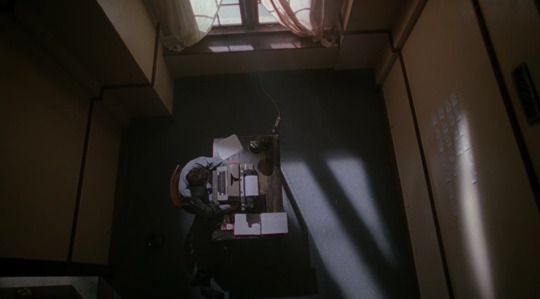
We first see Padgett pacing his apartment, the rhythm of his heartbeat pulsating constantly in his ears. This will soon affect not only himself but also Scully, a symptom of living in denial of human wants and needs. For Scully it's her attraction to and need for more from Mulder; for Padgett it's confusion about himself and his desires, living this meager existence in complete silence while waiting for genius to strike and his life to make sense-- putting his ear to the wall (a subtle foreshadow for the next scene), staring out into the waxing and waning afternoon sun, smoking cigarettes only to aimlessly toss them away when they fail to distract him, and finally giving in to that incessant beat.

He doesn't understand it, or himself; so he seeks to puzzle out the minds of others, looking for clues to escape the maze of his own.
He leaves the apartment briefly, staring into the fiery furnace of the basement, his heart staring back at him tauntingly elusive.
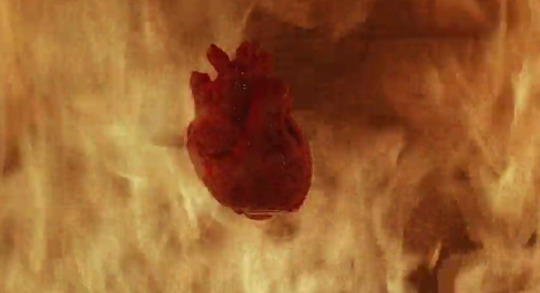
Padgett meets Scully coming up from the basement; and Scully is creeped out by his unblinking gaze at herself (not yet intrigued enough to be flattered by so much direct attention.) She is further paranoid when Padgett follows her down the hallway, unrelentingly staring even as he opens his own door next to Mulder's.
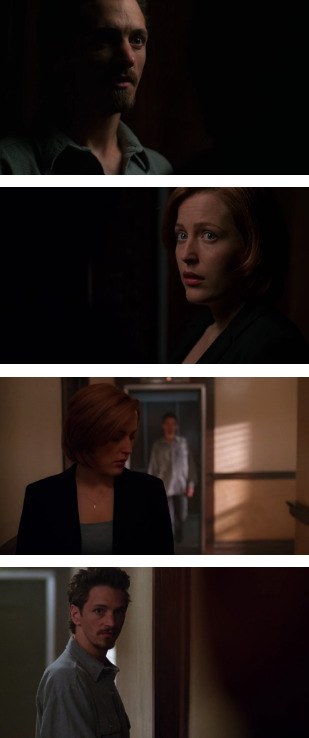
It's only after Padgett walks through his apartment door that Mulder opens his own, apologizing over a mouth full of toothpaste (which he swallows down with a cup of coffee while slapping his toothbrush on the coffee table.)
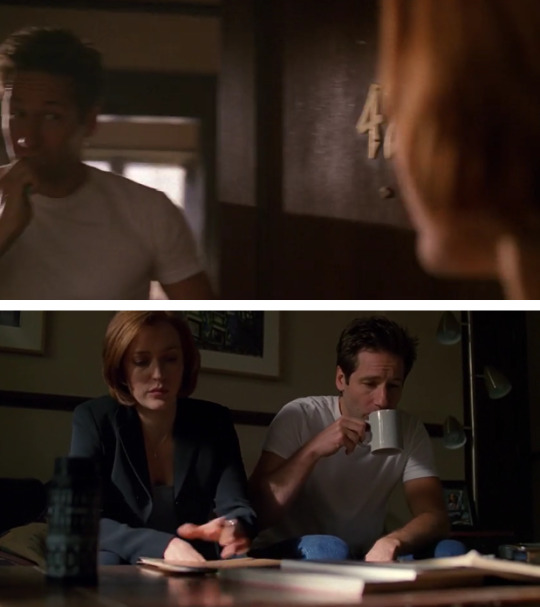
Scully casually brings up Mulder's creepy new neighbor, their rapport established enough that her partner doesn't think twice about her carefully disinterested questions-- not even noticing her interest, or queueing in enough to comment on it.
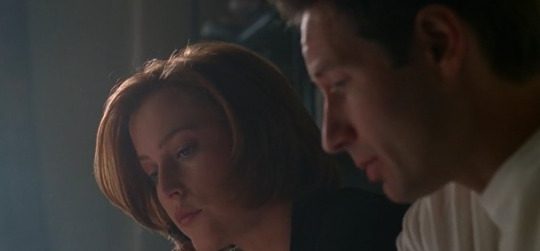
"You met him?"
"Uh, briefly, yeah. He's a writer."
"What's he write?"
"He didn't say."
She is shaken by her encounter, but Mulder doesn't pick up on it.
This becomes the core 'conflict' between he and Scully: she craves his attention; but Mulder is so consumed by his work that he takes it for granted she knows how much he cares for and values her. Scully, however, doesn't feel prioritized or valued; and that hauls up her rebellious teen spirit (smoking her mother's pack on the porch or consorting with the enemy) to refocus her partner's gaze solely on her.
Mulder, meanwhile, looks tired: brushing his teeth late in the afternoon, drinking a cup of coffee, eyes sleepy and body hunched over.

The camera shifts back to Padgett (resting purposefully on his ashtray filled with new, barely smoked cigarettes-- an habit he'd picked up from his object of study) as he steps menacingly onto a chair to overhear through the apartment's mutual ventilation system. He listens as Scully rattles off the lack of evidence in their second murder case, his tension slowly decreasing.

The camera then does a purposeful second shift: Mulder rises into frame in front of the ventilation-- Padgett's top-down observation post-- cornering Scully over her disbelief in his psychic surgery theory. He is in his element: not the sleepy eye-ed version of himself when she'd first walked in the door, but a driven detective with passion in his eyes-- something he hadn't shown for Scully (other than a peppy greeting, ready for her results.)

Scully watches as her partner sits back down and launches into an attempt to fit the square peg of psychic surgery into the round hole of medicine, squashing a brief smile to sustain her serious point: "Well, medicine-- as you're referring to it-- is about keeping people alive."
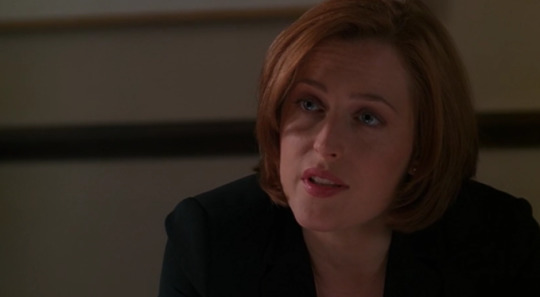
Padgett listens as his muse remains unflustered by the lack of evidence: "Well crime is only as perfect as the man or the mind that commits it." He takes this as self-confirmation that Scully's mind is ready for him to start his advances, flattered by her description of his talents-- which he is confounded by-- and further cements this opinion with her follow-up sentence: "You find his motive and you find the murderer."
Padgett retreats, parceling through his own mind in another attempt to "find the murderer" and understand his own motive. His smoking habit follows him into bed where he lays, confused, overwhelmed, awed by his own thoughts. He then shoots out of bed and types up another murder scene, attempting to conjure Naciamento and try to study himself through the work of his hands. Another fruitless murder, another dead end. Sickened by the horrors of his own mind, Padgett groups together his papers in horrified silence.

Finding no answers in words or actions, he decides to ignore what he cannot understand, setting the stage to meet his oracle.
Scully answers the basement office phone, tense and business minded, and listens to Mulder detail the crime scene. She spares a moment for the deceased before quibbling with her partner's request for her medical explanation-- "I'm not sure I could."
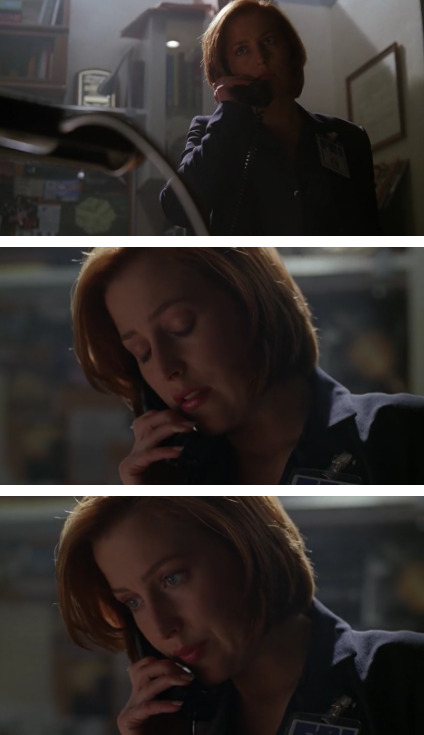
Both are at a loss where to start for the case-- "Well, there's got to be something, Mulder"-- an opportune moment for her to observe a lone envelope sitting brazenly in the doorway.
While filling him in on this new development, Scully tears it open and dumps out the milagro charm: "It's some kind of a pendant. Like a charm."
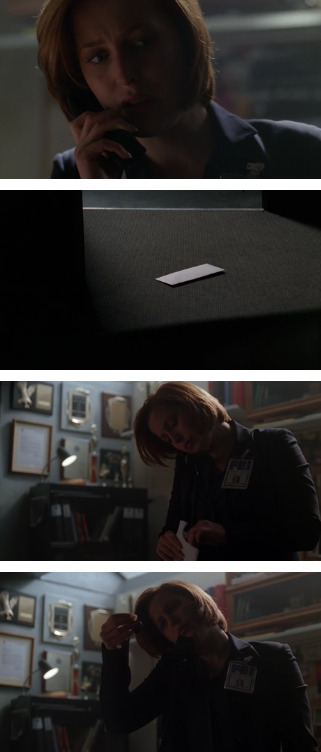
It's at this moment that Padgett writes over her thoughts, spewing out prose as Scully is sucked down, down, down with the words he plants into her head while Mulder waits on the phone for more information.
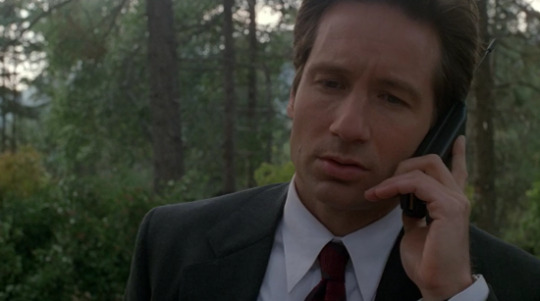
Padgett writes: "It would be a plain face, an average face-- a face people would be prone to trust. She knew this inherently being naturally trusting herself. But the image she conjured up was no better than the useless sketch composites that littered her files. Preconsciously she knew this wasn't her strength as an investigator: she was a marshall of cold facts, quick to organize, connect, shuffle, reorder and synthesize their relative hard values into discreet categories. Imprecision would only invite sexist criticism: that she was soft, malleable, not up to her male counterparts."
Two incorrect assessments on Philip Padgett's part:
#1. Scully is not inherently trusting, repeating Mulder's "trust no one" back to him more times than not. Her trust is in systems, order, ranks, and routines; but she has seen too much corruption by season 6 to give that trust out blindly. But from the start, she has always been wary of individuals, second-guessing victim statements and motives from the beginning; and Padgett, having read her wrong, sets himself up for failure and disappointment with his planned romantic interlude. It was not trust or sexual interest that draws Scully to his place (though he tried to draw it out of her)-- Scully is drawn to attention like a moth to a flame, hence the milagro symbolism rampant throughout.
#2. "But the image she conjured up was no better than the useless sketch composites that littered her files" is a sentence directly from Padgett's mind: empty, staring at his notes all day, ready to strike at genius but lacking anywhere to start.
It's the theme of this episode: the waiting (queued by a striking absence of most of the musical score), the dysregulation of Padgett and Scully's thoughts (Mulder peeps into that disorder when he reads Padgett's 'novel' later), the fear of being known without knowing themselves and being left behind in solitude because of that misunderstanding.
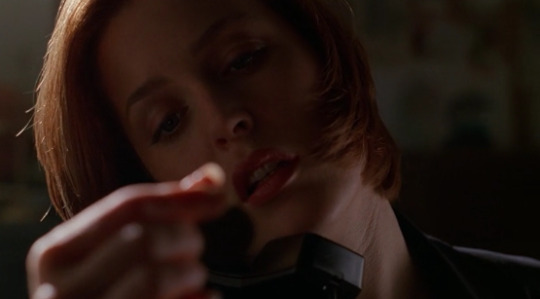
But this is Scully: "Yet the compensatory respect she commanded only deepened the yearnings of her heart,--to let it open, to let someone in."
When Mulder arrives, fiddling with the charm and listening to Scully's description from reception, his first assumption is: "It came here for me?" And while that is a reasonable assumption, it is also his and Scully's first assumption-- harkening back to Never Again's lines that were unnecessarily drawn. He flicks it in the air, creating a tinkling sound in the stillness, and denies that this guy is the killer despite his partner's difference of opinion.

His mood drops, his jaw shifts before he replies, "Maybe it's not me at all," and adds (with too quick) cheerfulness, "maybe it's for you."
Scully pauses, but before she can sort her feelings, Mulder's remark-- "Maybe you've got a secret admirer"-- forces a startled chuff out of her. She tries to disguise her growing unease in surface-level huffery, a someone-would-annoy-me-that-way-wouldn't-they? cover that her partner, of course, doesn't see through...
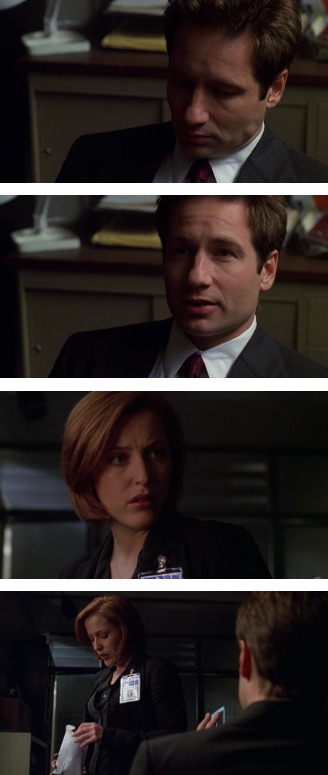
...since he's already focused on the next bit of leg work he wants Scully to do-- without consulting her, of course.
But Scully is not in a stable mood today, feeling vulnerable, maneuvered, and dismissed. In an echo of Never Again, Scully pauses, offended and hurt; and plants boundaries: "Thank you for making my schedule, but I think I'm going to have to be late for that appointment."

Mulder's lack of emotional nuance has placed her back in the shaky and questioning territory of the Ed Jerse fiasco, feeling like an accessory to work rather than a valuable member of the team. Even further, the original script for Milagro notes that Scully has started unbuttoning her professional garb more than usual after hours with her partner, presumably in a last-ditch attempt to draw Mulder to her. When that doesn't work, she will use Padgett as he has used her partner's apartment, the murders, and the milagro, each waving their flags uselessly for the object of their affection's attentions. It's the ouroboros of Scully's existence, a cycle she has yet to break (I HIGHLY recommend @suitablyaggrieved's essay on the ouroboros, the cycle of grief and death and failure. Phenomenal.)
Mulder is struck that Scully leaves so suddenly, following her out with his eyes for the first time.
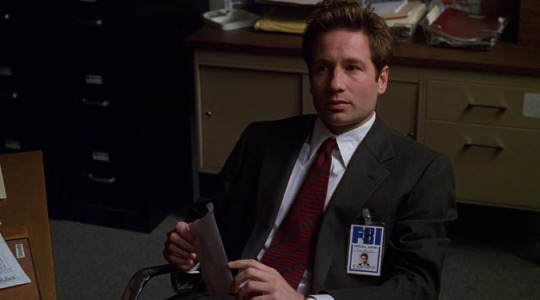
At the church (and in a shot similar to Scully's entrance of the Buddhist Temple in All Things)

she is shadowed by a beating heart soon revealing itself to be Padgett. He seemingly steps from nowhere, as if conjured from Scully's mind, interrupting her mediation of the milagro and begins to relate his motives through a thinly veiled retelling (to Scully's initial confusion and increasing fear-- convulsively swallowing and shoulders tensing): "Christ came to Margaret Mary, his heart so inflamed with love that it was no longer able to contain its burning flames of charity.
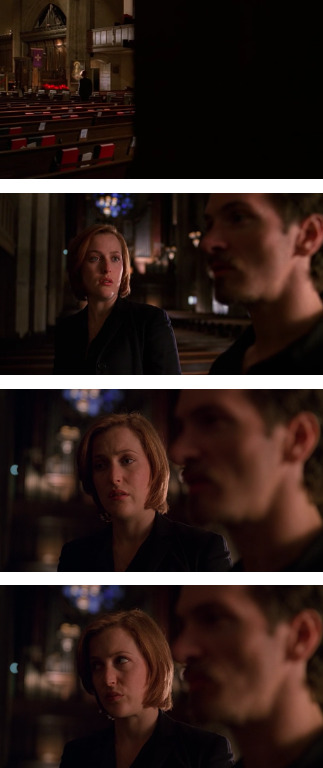
Margaret Mary, so filled with divine love herself, asked the Lord to take her heart."
At that Scully swivels her head around, filled with premonition.
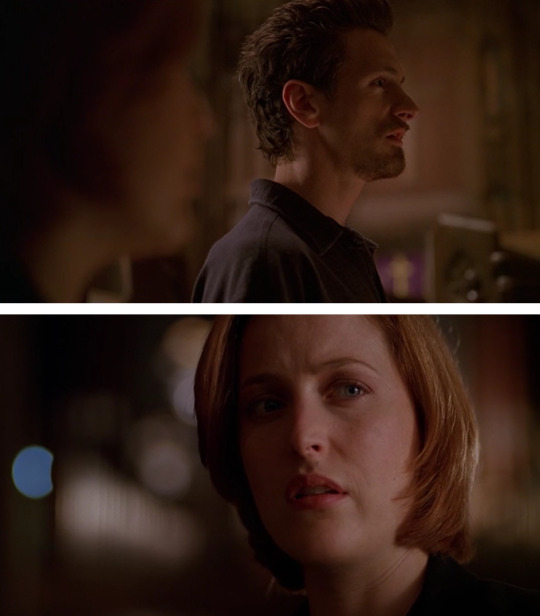
"And so he did. Placing it alongside his until it burned with the flames of passion." Padgett pauses, filling his soul with longing himself,
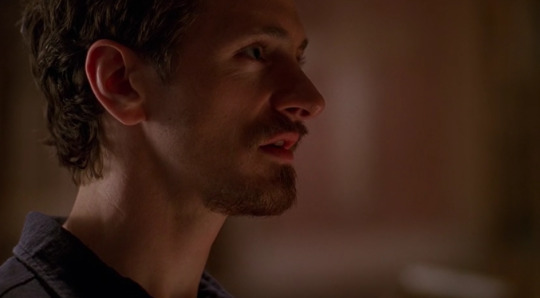
before continuing: "Then he restored it to Margaret Mary, sealing her wound with a touch of his blessed hand."
Scully is back to doubt, asking this strange man why he is there and answering a frank "Yes" to his own question ("You came here specifically to see this painting, didn't you?") Her terseness returns: "How did you know that?"
Padgett is delighted that Scully "knows" him, that she'd looked at him long enough to recognize him; but it's more telling that Scully still couches her relationship with Mulder as "somebody I work with" to outsiders.
"Why are you following me?"
"I'm not." Another pause. "I only imagined you'd come here today."
Scully looks away, squirming to get away as much as possible.
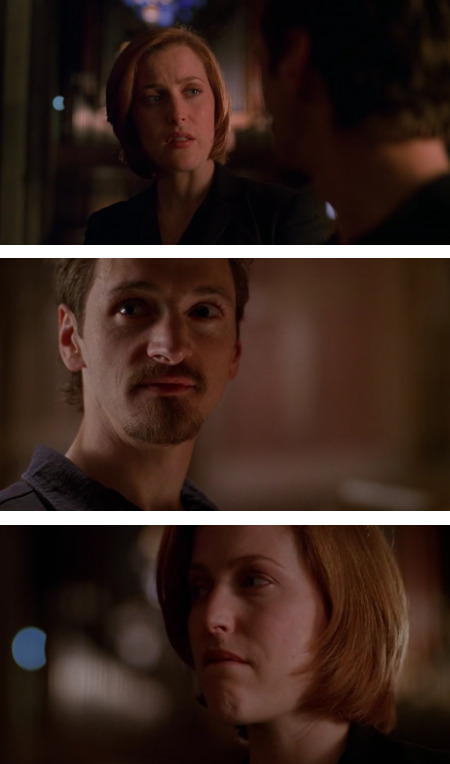
"I'm a writer. That's what I do: imagine how people behave."
Scully ceases all movement as the writer methodically details how he knew her beliefs by staring at her necklace, deduced her job by staring at her license, determined that she runs and where by staring at her calves, and combined all of it to predict her movements that day.
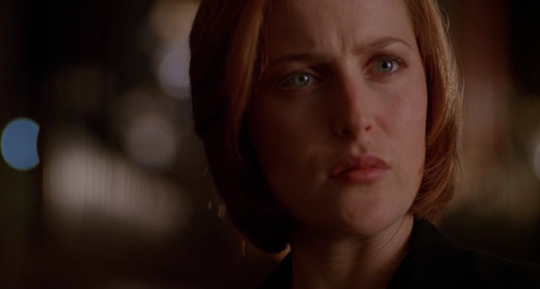
An interesting note: Padgett correctly guesses that Scully comes to the church "not as a place of worship, but because you have an appreciation or architecture and the arts."
The horrifying whole is complete when he reveals the milagro charm was from himself and that, he admits, he has "a secret attraction."
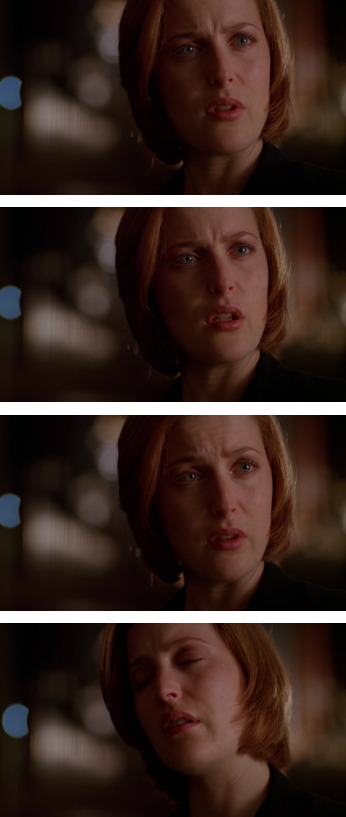
She sloughs off his mild apologies for excluding a note ("I'm sorry I didn't include a note explaining that, but you didn't know me then") with a reproof: "Yeah, and I don't know you now. And I don't care to." To his "I see this is making you uncomfortable", Scully raises her eyebrows in a shadow of her normal mockery; and to his "and I'm sorry. It's just that I'm taken with you" that she turns back, contemplating him in contempted curiosity. At his "That never happens to me", the contempt drops away to chilled fear, facing down another unstable person that has obsessed with her (a shadow of Pfaster.)
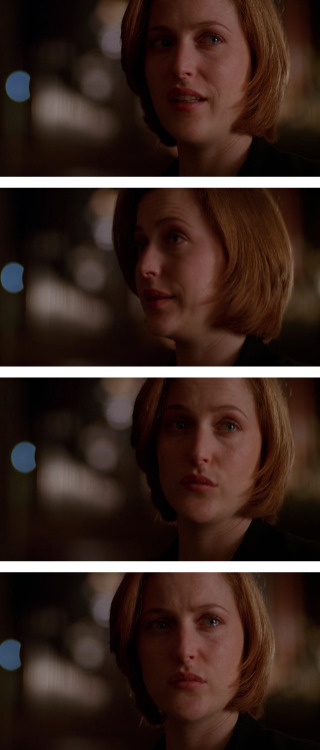
"We're alike that way," Padgett whispers.
Scully maintains a long look; then slowly and cautiously-- with both ears open in case she needs to flee-- walks away, Philip Padgett gazing after her in her wake.
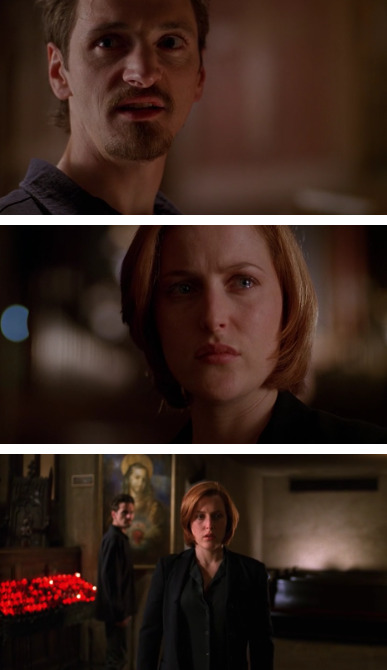
Padgett the Avatar
Not only is Philip Padgett a darker version of the psychotic psychic in Clyde Bruckman's Final Repose-- creating deaths in a wandering journey of self-enlightenment-- Padgett is also a character that is a stand-in for many, many different and conflicting things: a creepy pervert who wants love, a character aware of his own meta themes, a personification for the zoned-out-zoned-in audience, a symptom of the people who spent hours writing a show about the truth while avoiding it in their real, humanly broken lives.
A cut line from the script (curtesy of @dunhamhairograpy) beats all of these ideas into one 'theme': Naciamento, fed up with Padgett's confusion, yells "No, no! You had it all right up to there. You were a tool of the truth. After all these years of misery and failure, you finally look deep into your heart and what do you get: ME! I am you, Padgett! I am all men. ...You sit here endlessly, waiting to tap into the truth. And when it arrives-- when I arrive-- you don't want to see it." This, of course, extends to Scully and trickles off onto Mulder: Scully is alone but doesn't want to face it. Why would she when her partner has avoided all serious attempts to do so, only confessing his love when something dire was happening? Mulder's not ready, may never be ready; and Scully's resigned herself to that fate-- "Loneliness is a choice"-- because she can't, won't lose him.
This leaves one Philip Padgett with a few realizations: he will never get the girl and he will never write the novel; but what he can do is offer his beating heart another way, as the benevolent god leaving a mark 'for the better' on the lives of those he's stirred up with strong emotions-- even if they weren't the emotions Padgett wanted to create. An artist will take legacy if he can't have love, no matter how selfish or damaging. A selfishly human desire mixed with heavenly self-sacrifice with hellish vainglory, a poor imitation of the milagro by a soon-to-be dead man on a dusty basement with his heart still in his hands.
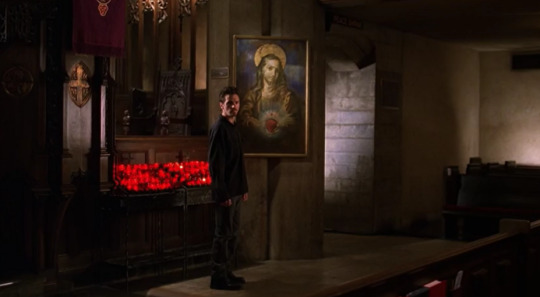
Part II will be up soonish (hopefully before the week is over!)
Bonus
Here are some meta that helped clarify my ideas, if you (like me) are lost in the woods about Milagro's metacontextual narrative (aka the fluffy purple prose got you all twisted around):
@swinging-stars-from-satellites's meta;
@iconicscullyoutfits's meta and specific meta on fire, Scully, Jerse, and Padgett and this specific meta about Scully's Truth;
and @scullysflannel's meta.
Other scripts found here (@x-files-scripts) and on this website.
And, for fun, here is Carter's and Spotnitz's introduction to the episode (with hilarious Gillian Anderson commentary and reactions.)
Thank you for reading~ (and thank you to the person who requested a Milagro breakdown-- I scrounged around but couldn't find the exact message; but your push got me into dissecting and understanding it a whooooooooooole lot more, so thank you!)
Enjoy!
#txf#x-files#xfiles#the x files#Beating Beating Through the Apartment Door#meta#xf meta#In-Depth#Milagro#S6#Part 1#Mulder#Scully#Philip Padgett#mine#Padgett#interview
50 notes
·
View notes
Text
FINALLY finished Prince of Dreams (it took longer than usual, not due to a lack of enthusiasm but a lack of time) and my God... that shit was FIRE, and I will be expanding upon why at some point BUT!
I'd be remiss if I did not point out a clear pipeline from Jude Deveraux's CLASSIC A Knight in Shining Armor (which, yes, is dated in some ways, hello 1980s fat-shaming, but also is absolutely an integral romance novel, in my opinion, when you look over the span of the genre).
Jude is very much a foundational romance novelist. If you never try a Jude novel, I think you're missing out. There's this inherent comedy to her writing conveyed through witty dialogue and wacky hijinx, and some truly fucking INSANE plots. I also find that she does a really good job with setting up a Moment in her books, and you often get these really fun side characters. The Princess is the first Jude book I'd read in a WHILE, but it's so good. Even the "Daddy Montgomery" thing (in which the hero calls himself Daddy Montgomery even though he's just met this woman and is administering CPR) is like, fine. I'll accept it. It was the 80s.
A Knight in Shining Armor, which Jude has said (in a really good interview on the Fated Mates podcast, should you wish to listen) is a book that really changed her career... is really a daring romance novel. For so many reasons, some of which I can't get into. But it sets up this balls to the wall dual time travel thing (where the hero initially travels from the 1500s to the 80s, and the heroine later travels BACK to the 1500s) and like... a truly dickish hero. Who has to learn TWICE, for more reasons I can't get into.
But you have things like the insane mysticism which isn't ever quite explained because that's not the point. You have the element of love across centuries, which I think is really hard to convey, and many readers interpret it as like... cheating? When it's really this soul-deep connection that transcends time in both these books.
And you have. A Thing. That makes the hero look really bad. A thing that I don't think we see enough of in a genre that predates modern contraception, but like. It's not that presence of the Thing, it's the way the hero HANDLES it. Him becoming better in that sense is crucial to his character development, and it goes beyond the heroine and pleasing her and moves towards making him a whole person.
In some ways, I think I personally prefer Prince of Dreams, BUT I don't think it's difficult to see where Kleypas, a historical romance novelist writing in the aftermath of that book's success, would have some inspo and sort of do a response. I mean, there are many romance novelists who played with reincarnation and time travel back in the day, from what I understand, and I wish we saw more of that.
I mean. Sierra Simone is certainly doing it...
But I think this idea of a love story that transcends not only time but basic identity and has to fight for recognition in multiple eras is SO. SO. GOOD.
4 notes
·
View notes
Note
How invested do you think the family would be in Bruno's telenovelas? From least to most interested?
oohh good question 🤔 I'd like to imagine that it becomes a staple in Casita and there are designated Ratnovela evenings where they all get together after a day of hard work and have some quality family bonding time.
(this is from most to least interested but let's be honest, they all love it)
1. Dolores (I mean obviously. She got to listen to all the seasons in real time and it's the first gossip she overhears without it invading someone's privacy and she can actually talk and gush about it with someone)
2. Camilo (would probably deny it if someone asks him but as an actor himself he just looooves the drama, the intrigue and theatrics. He gets some tricks from Bruno and they both do acting classes together)
3. Luisa (Effectively keeps her mind off of work with it and ever since they rebuilt Casita and she has more time, she's been trying to find more things to occupy her mind with like reading and trying a bit of everything. She does love a good story and when she's working she tries to figure out what happens next. Actually gets the closest to)
4. Antonio (Bruno makes sure to only give him the kid-friendly versions and Antonio's just really enjoying them. Especially since he can actually understand the rats who break the 4th wall more than a few times and make him laugh)
5. Pepa and Julieta (It just reminds them so much of their childhood when they would all act out stories and listen to Bruno's ideas and seeing him in his element fills their heart with joy. Also they do love some good drama and have the inside knowledge of knowing the people some of these characters are based of and why, making it 100% more entertaining for them)
6. Félix (Totally into it! Has to be quieted down a few times because his reactions actually interrupt the story frequently. But it also adds a certain charm to hear him gasp and laugh out loud and Bruno loves the enthusiasm)
7. Mirabel (A little sceptical in the beginning since her first impression was the whole "aunt with amnesia" thing, but quickly grew to love it. She gets involved in the process and helps Bruno make the sets and costumes)
8. Isabela (gets a bit too heated when a certain plotline hits too close to home "WHAT ARE YOU DOING DON'T MARRY THAT !$&§?@!$ YOU'RE TOO GOOD FOR HIM" and complains that it doesn't even make sense. But she has that one character that she stans and watches the whole telenovelas just for them. It's more of a guilty pleasure for her and she has to admit that the writing's pretty good actually. It's just too much romance for her, not enough self-discovery and lack of strong female leading characters)
9. Agustín (Confused like 90% of the time with the story and can't keep up. Probably missed every crucial moment that happens because he hurt himself and had to go grab some food and then when he comes back someone is dead and help. Also probably the type to forget everyone's name and mix up all the plotlines. But he likes to be a part of the "telenovela nights" and is just happy to see his hermano happy)
10. Alma (her children are all theater kids and she never really understood that fully. But whenever she got to overhear them she always had a smile on her face, happy that her kids never had to experience her trauma and could still be creative and dream up wild stories. She cried the first time after Bruno came back and they all got to listen to his ratnovelas because she was reminded of simpler and happier times. As for the story.. she just doesn't get it. Not in a bad way but she's confused the same way my grandma would never understand fantasy or anime. BUT SHE TRIES)
#damn this turned out waaaay longer than i though omg#this is just my headcanon tho#all of them love them it's just a matter of hoooow into it are they#switched up the order because it was too late already lol#ask
56 notes
·
View notes
Text
“A Romantic Partner Won’t Complete Me, Because I Was Born Complete”: How Identifying As Asexual & Aromantic Brought Me True Freedom & Happiness | Yasmin Benoit for British Vogue
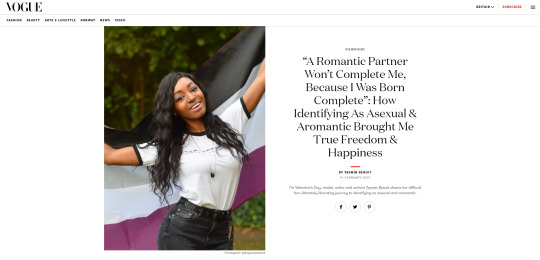
There is a phase in our lives where everyone seems asexual and almost everyone seems aromantic. It wasn't until puberty kicked in that platonic relationships seemed to take a backseat. My peers stopped wanting to play together and started wanting to 'date' each other. That was when I started to realise that there was something different about me. I didn’t seem to be experiencing the same urges as those I was around. I chose to go to an all girls school in the hopes that – in the absence of boys – everyone would stop caring about sex and dating. It actually had the opposite effect. There was a sense of deprivation in the air and the heightened desire to project their sexuality onto anything and everything.
Therefore, my lack of interest became even more obvious, and it became a not-so-fun game to work out the source of what should be troubling me, but hadn’t been until that point. Having a sexual orientation isn’t just natural, it’s essential. It’s part of being a fully-functional human being. And to be romantically love and be loved by another is the ultimate goal. It’s part of being normal, which made me both abnormal and puzzling. When your asexual, people think there’s something wrong with your body. When you’re aromantic, they think there’s something wrong with your soul. Even for a teenage girl who internalised all of Disney Channel’s “be yourself” messages, it’s never nice to have people publicly debate your supposed physical and psychological flaws.
My nickname in school was “hollow and emotionless.” I was a joker with a decent amount of friends, but I was lacking something crucial, the kind of love that really mattered and the kind of lust that made life exciting...so I was practically Lord Voldemort with braids. I sat through the regular DIY sexuality tests, having my peers show me graphic sexual imagery, have very sexual conversations in my presence, and ask me inappropriately intimate questions to gauge how far gone I truly was. These tests lead to the development of theories, most centred around me having some kind of mental problem. After a while, you start to wonder if everyone knows something you don’t.
When they said that I must have been molested as a child and “broken” by the trauma, I wondered if I had somehow forgotten about sexual abuse that actually hadn’t happened. I looked at some of my own relatives with suspicion, the same people who would later ask me if I didn’t experience sexual attraction because I was a pedophile. It was suggested that I was “suffering” from my “issues” because I was socially anxious and insecure. The suggestion that my ‘issue’ was pathological stayed with me for a long time, but not as much as the widely accepted theory that I was mentally slow. Unfortunately, that one stuck. I was referred to as “stupid” and I started to believe that was the case. It would impact my experience in education for the next eight years, long after I realised that there was a word for what I was.
Asexual.
I first heard the word during one of the near-daily sexuality tests that I was subjected to. I was asked if I was gay, to which I said that I wasn’t interested in anybody like that – men or women. At fifteen, I was asked, “Maybe you’re asexual or something?” but it wasn’t quite a lightbulb moment. How could it be when I had never heard the word outside of biology class? After an evening of Google searching, I realised that there were many people with my exact same experience, complete strangers whose stories sounded so strangely similar to mine. I also stumbled across the word ‘aromantic,’ but at the time, I didn’t understand the need for it. "Wouldn't all asexual people be aromantic? A romantic relationship without sex is just friendship with rules,” I thought.
Either way, my discoveries showed me that I wasn’t alone, but that only half helpful. I now had an identity that no one had heard of or understood. Most didn’t believe that being asexual or aromantic was a real thing, and I doubted it to. I had been taught to after years of armchair pathologisation. If asexuality was real, why did no one tell you that being sexually attracted to nobody was an option? What if it was just an internet identity made up to comfort people with all of the issues that had been attributed to me? I didn’t have to go far down the rabbit hole to realise that asexuality, like many non-heteronormative identities, had been medicalised. What I had experienced as just the tip of the iceberg. As someone who hadn’t been prescribed drugs I didn’t need or subjected to unnecessary hormone tests, I was one of the lucky ones.
My activism would be my gateway to the community. Despite being the ugly friend at school, I ended up becoming a model while in university. I decided to use the platform I had gained through my career to raise awareness for asexuality and aromanticism. It gave me the opportunity to encounter a range of asexual and aromantic offline, it was then that I learned the significance of having an aromantic identity. There are many asexual people who still feel romantic attraction, as well as aromantic people who still feel sexual attraction. They have their own range of experiences, their own culture, their own flag, and like the asexual community, I was relieved to see that they are just normal people. These intersecting communities are not stereotypes. They weren’t just thirteen year old, pink haired kids making up identities on Tumblr to feel special. They were parents, lawyers, academics, husbands, girlfriends, artists, black, white, young, old, with differing feelings towards the many complex elements of sexuality and intimacy. Most importantly, they were happy.
I am proud to be part of both, and I know that while being asexual and aromantic, I am a complete person and I can live a perfectly fulfilling life. Since meeting members of my communities, I’ve become more open about my identities in real life, and a reaction I’m often met with is sympathy. “You must feel like you’re missing out,” “I can’t imagine being like that,” “It must be hard for your family,” “Do you worry no one will want you?” “How do you handle being so lonely?” “You’re so brave and strong,” “What will you do with your life now?” Even in 2021, a woman who isn’t romantically loved or sexually desired by their “special someone” is perceived as being afflicted with some kind of life-limiting condition.
Asexuality doesn't make undesirable or unable to desire others. It is a unique experience of sexuality, not a deprivation from it. Even if it was, there is so much more to life than what turns us on and what we do about it. Romantic love is just one form of love, neither superior nor inferior to any other. Being aromantic doesn't mean that you can't love or be loved, it does not mean you are void of other emotions or capabilities. I am not lonely with my friends, family, co-workers and supporters. I feel confident not when someone wants to date me but when I meet my goals and form worthwhile connections with others. My success isn't determined by whether someone will want to marry me someday. What we want out of life is our decision alone, our sources of happiness should not be defined by our ever-changing, culturally relative social standards. The love of a romantic partner won't complete me because I was born complete. Feeling sexual attraction to others won't liberate me because my liberation is not dependent on other people.
Valentine's Day is on the horizon. It's an occasion that amps up the focus on (and the pressure to achieve) a very specific type of love and sexual expression, one that is actually alienating for people inside and outside of the asexual community. During a pandemic where many relationships have been strained, tested, formed or distanced, it's important to keep the diversity of romantic and sexual feelings in mind. Many expect me to feel annoyed or lonely during this time of year, but I actually feel empowered and excited by the way sex, romance and love are discussed more deeply around this time. These conversations are constantly expanding to become more inclusive for everyone, and that's what we need to see all year round.
https://www.vogue.co.uk/arts-and-lifestyle/article/asexuality-and-aromanticism
#yasmin benoit#valentines day#british vogue#asexuality#aromantic#aromanticism#aroace#asexual#this is what asexual looks like#thisiswhatasexuallookslike
673 notes
·
View notes
Text
Chemical Weddings in RWBY
So once upon a time Hamliet said she’d write a meta about ships in RWBY, and then arrived months later without Starbucks.
The central tenet of alchemy is solve et coagula: dissolve, and then coagulate. The process (RWBY appears to be following Ripley’s 12 Gates) repeats, rinses, and repeats again and again throughout the steps, “each time at a more refined level.” The point of a chemical wedding is to reconcile opposites, which is something I touched on in my pseudo-quick meta here. Lyndy Abraham, the author of A Dictionary of Alchemical Imagery, describes the chemical wedding as:
a crucial operation in the creation of the philosopher’s stone. The alchemists were ultimately concerned with the union of substances, the reconciliation of opposites.
Basically, it unites opposites (fire and water, air and earth, sun and moon, passive and active, etc., etc., etc.) and then the opposites start to take on each other’s qualities, creating the “Rebis,” or a person both male and female.
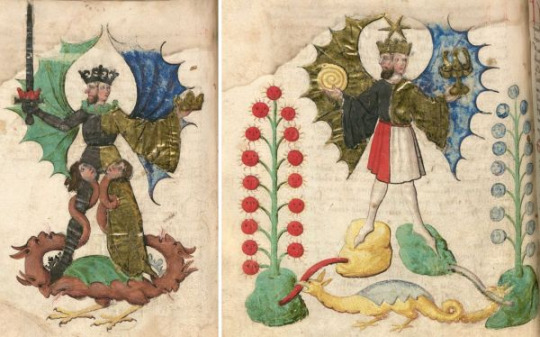
The first chemical wedding is usually somewhat violent, primitive even, whereas the second one signifies the creation of the stone. However, characters can have more than two weddings, and chemical weddings do not inherently have to be romantic--Sam and Frodo aren’t, for example--but most often are, because it’s the most obvious way to show a union between separate people (the old adage “two become one” in marriage, for example).
If we look at George Ripley’s 12 Gates, chemical weddings tend to be focused on in the fourth stage of conjunction (which I wrote about here) and in the ninth, fermentation (which is probably going to be in volume 10--maybe a little in volume 9, but traveling between worlds seems to be a hallmark of sublimation in fiction so I’m guessing we’re stuck there for the time being). But in a lengthy series spanning eight years and counting, there is going to be overlap.
So let’s talk about chemical wedding imagery historically. It tends to involve dissolution (via water or fire--keep in mind metal was associated with fire in olden days, so stabbing with metal was considered liquid fire, or so it was believed to be by alchemists) and then coagulation (healing/coming together).
Four of the five ships--two of whom are definitely happening, one of which I think is happening and one of which I think has a good chance--reference historical alchemical artwork and symbolism in key moments. (RWBY does reference alchemical artwork; see here and here.) So let’s dive in and examine potential chemical wedding allusions in RWBY:
Lie Ren/Nora Valkyrie (Renora)
Let’s start with the most obvious couple: Ren and Nora. Their first chemical wedding occurs when they are children. In alchemical art, birds are often used to show the volatility/primitiveness of a first chemical wedding:
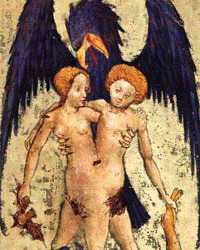
The raven is replicated in the Nevermore which forms a similarly threatening pose over Ren and Nora when he unlocks his semblance to protect her, thus honoring his father and mother’s legacies.
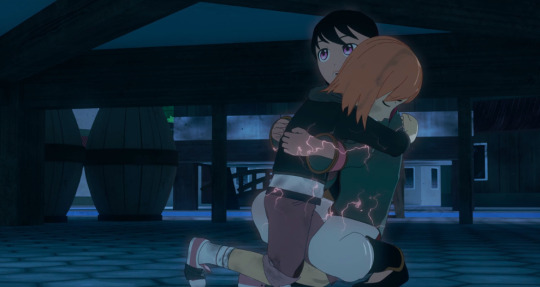
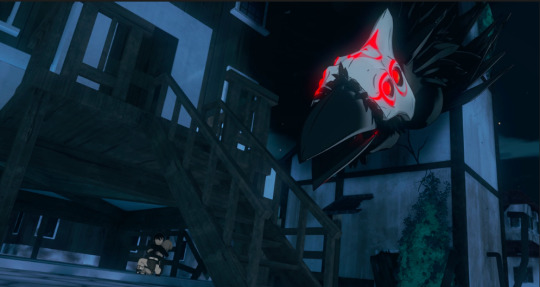
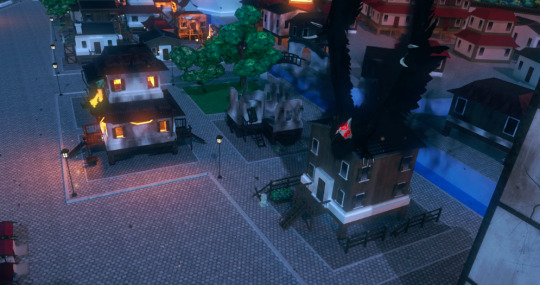
You can even see earth (trees), water (river), fire, and air (the bird flying) in the scene as it pans out. After this, Ren and Nora become “Ren and Nora,” as Nora herself says in Volume 8. They’re inseparable, because they’re on their way to becoming one. However, unification doesn’t mean that they’re literally the same person; in stories like these, it’s more like they become better versions of themselves through growing towards each other and adopting each other’s traits (like Nora’s courage for Ren, and Ren’s caution for Nora).
Their second, elevated chemical wedding is in the same place as their first, when in Volume 4 they return to the village and defeat the monster they were too young to defeat last time. This time, Nora is the one who protects Ren by telling him he could not sacrifice his life by pulling Ren back, in a reversal of his running to her in their first moment years ago.
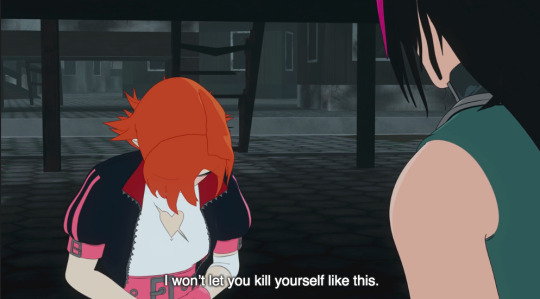
Like the first, there’s water involved--Ren and Nora hide next to a river, watching as the Knuckelvee advances on them. I talked previously how I thought this looked like a possible allusion to this alchemical image (look at the moon symbol on the head of the aggressor):
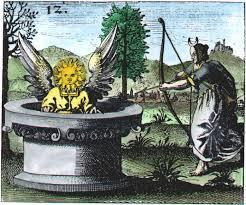
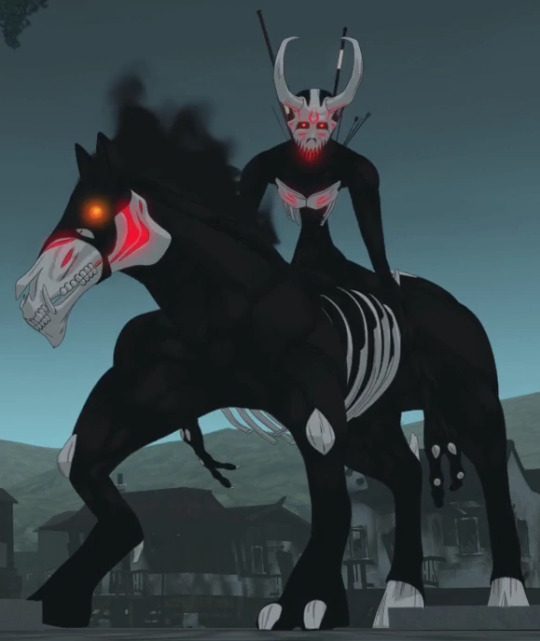
The moon symbol actually shows up quite a bit in this scene, first when Nora and Ren discover the Nuckelvee is still alive in the cave:
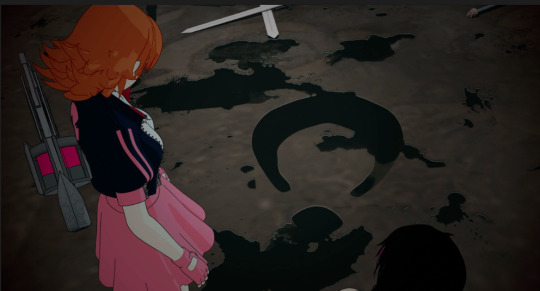
And then in the moment when they defeat it:
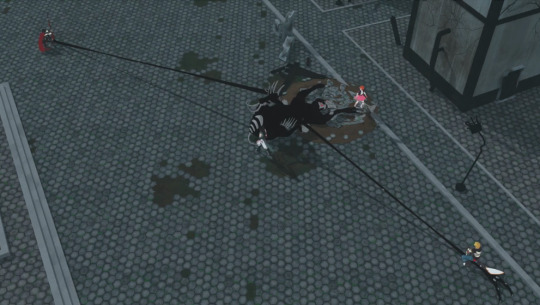
While I am certain this is a chemical wedding, I’m not certain why the moon symbol is so prominent in this, though I do think it is possibly in reference to this image and how Nora and Ren are united now:
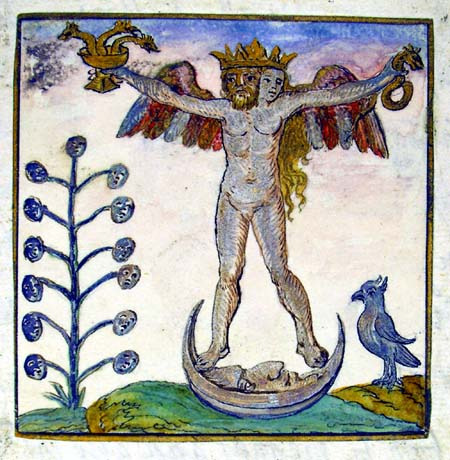
Yang Xiao Long/Blake Belladonna (Bumbleby)
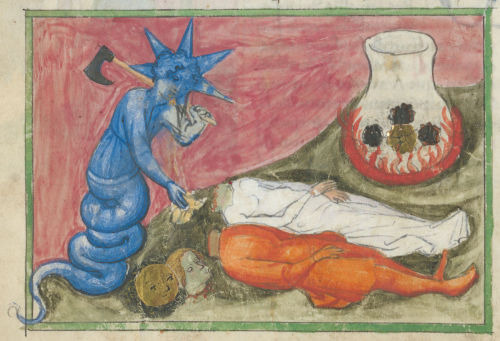
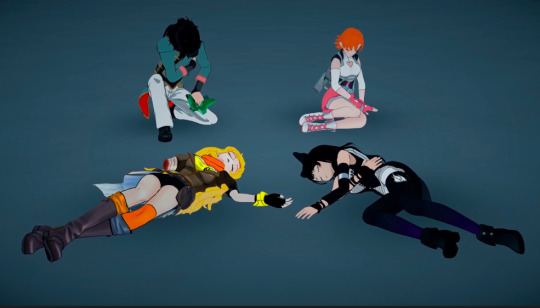
Firstly, the alchemy image is somewhat of a creepy image, right? In this, Mercurius has united the two principles by beheading them (amputation is a Thing in alchemy), leaving them to putrefy and then coagulate.
Like the Nuckelvee for Nora and Ren, Blake and Yang have a somewhat antagonistic Mercurius who unites them: Adam Taurus. He doesn’t cut off their heads, but he does seriously injure Blake and cuts off Yang’s arm in a scene that is romantically charged (you have Blake’s possessive ex telling her he’ll target someone she loves and specifically chooses Yang).
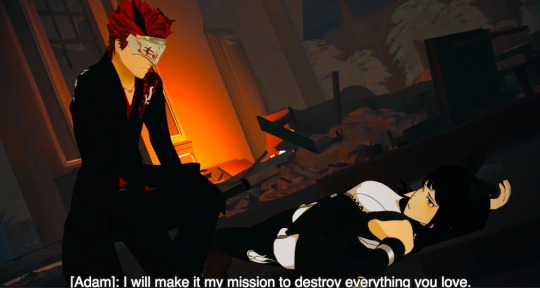
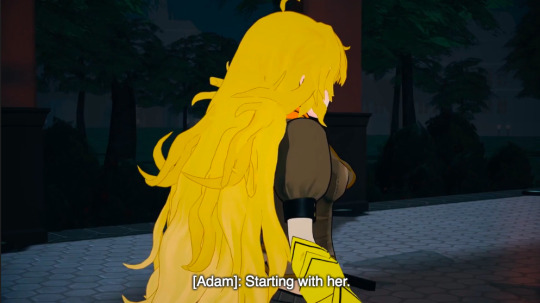
While I have my issues with how Bumbleby is written, it’s hard to interpret that as anything other than him seeing Yang as a rival for Blake’s affection.
Their second chemical wedding also involves Adam. There’s no one direct image that seems to have inspired it, but it does take place in a place full of waterfalls (fountains and flowing water in general, like the ones in Nora and Ren’s village, are common elements of chemical weddings’ settings) and by the ocean (the “mercurial sea” is where the elements dissolve to make the Philosopher’s Stone, so it’s also a common hallmark for chemical weddings).
(To briefly address this: this is where my complaints about the writing pile in, because you can also make a damn strong case that Blake and Sun fighting on the ship to Menagerie is a chemical wedding, which it is, but I think it’s clear at this point that Bumbleby is endgame. Either both were written for a reason, like if they weren’t sure if they could do Bumbleby, or a narrative reason, in which case Black Sun should have been dealt with rather than hand-waved away, or they were just teasing, but baiting fans is never, ever good writing; it’s cheap. All that to say that while I think there’s a compelling case they were interested in pursuing Bumbleby from the start, Black Sun shippers have a right to feel tricked and not all criticism thereof is based in homophobia or a lack of narrative understanding, or even in a dislike of the ship.)
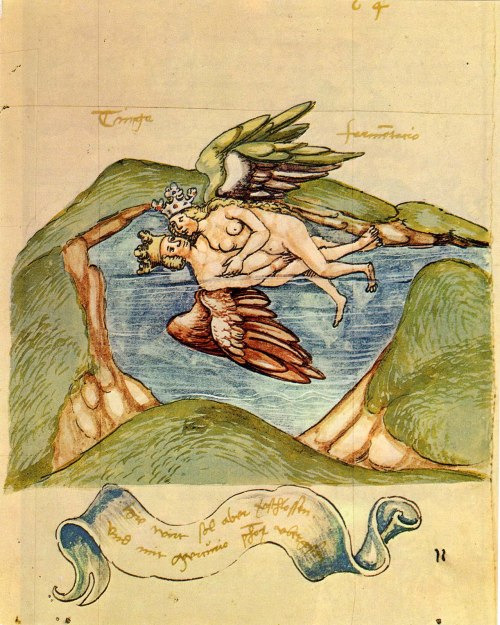
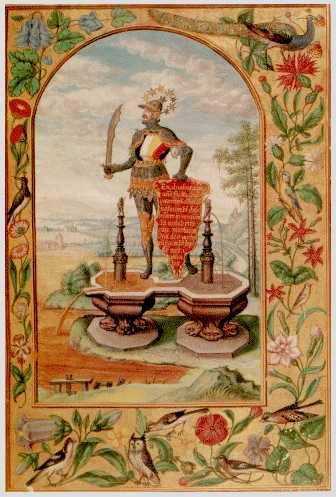

At the beginning of this scene, Adam makes it clear that this is a redo of their previous chemical wedding by reminding them of it:
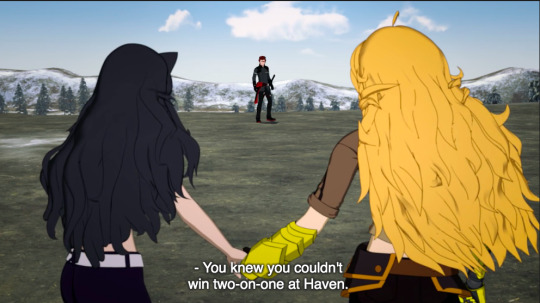
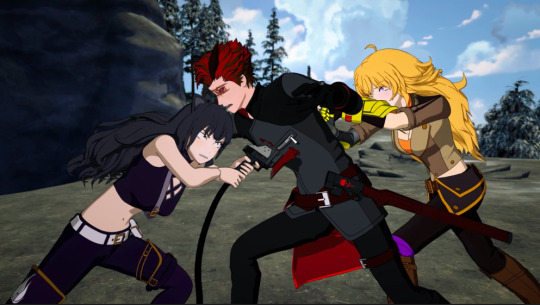
Blake stabs Adam with a silver weapon; Yang with red. We have earth, air (clouds), water, and weapons as a stand-in for fire.
It’s still somewhat of a violent wedding, which makes me wonder if Bumbleby will have a third (and Renora as well). But it also parallels Renora in this: returning to a pivotal scene where they were traumatized, but this time being able to overcome it because they’ve become more like each other. Blake is in many ways Yang’s trauma stretching far beyond Beacon (Blake runs away, as does Raven, Yang’s mother who abandoned her), and likewise Yang for Blake (she’s hotheaded and holds grudges, like Adam). But Blake and Yang have been working on becoming better versions of themselves.
At the end of this scene, they even exchange quasi-wedding vows (since Blake’s promise is to not abandon Yang):
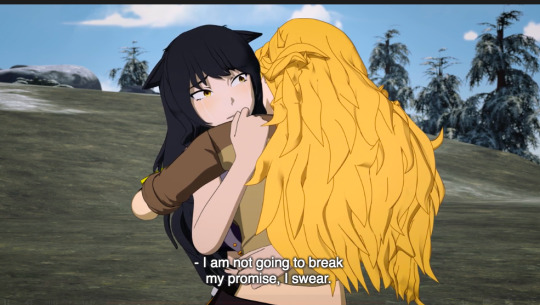
And the artists drive home the point by drawing Blake’s hair far bushier than normal (more like Yang’s), and Yang’s far tamer than normal (like Blake’s).
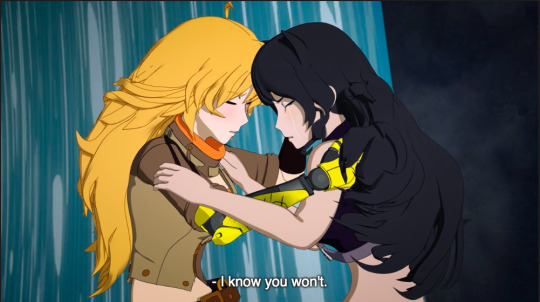
Jaune Arc/Weiss Schnee (White Knight)
Weiss and Jaune have had one chemical wedding thus far (possibly two but not sure) and I didn’t ship them at all until I saw this scene. Like Bumbleby and Renora, they have an antagonistic Mercurius: Cinder.
(This one I’ll be arguing a little bit about why I think it’s set up for romance as well.)
In this scene, Cinder directly compares Weiss to Pyrrha in regards to how Jaune feels about them (and we know Jaune and Pyrrha were romantic--you can also argue Cinder was an antagonistic Mercurius uniting Pyrrha and Jaune).
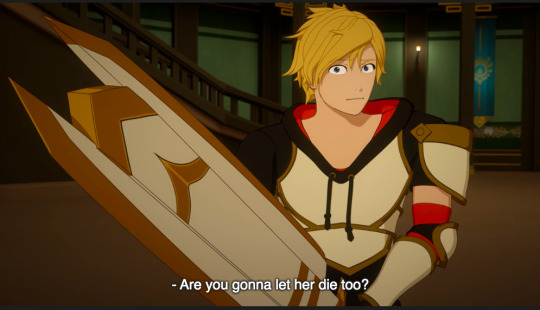
When Weiss screams, Cinder gets an idea and slides her gaze from Weiss to Jaune.
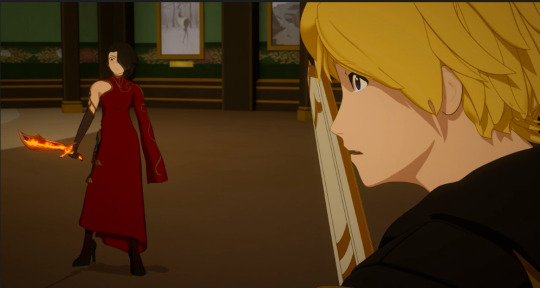
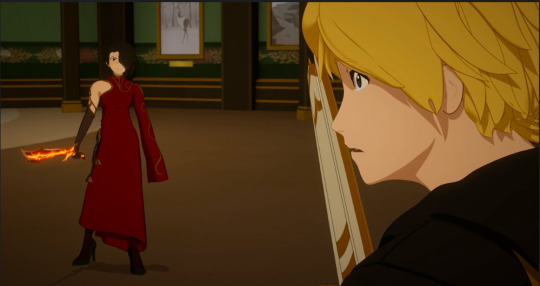
And then reenacts this:
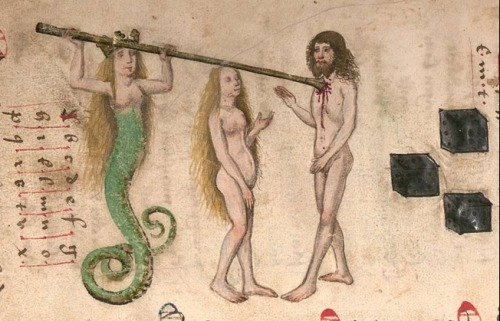
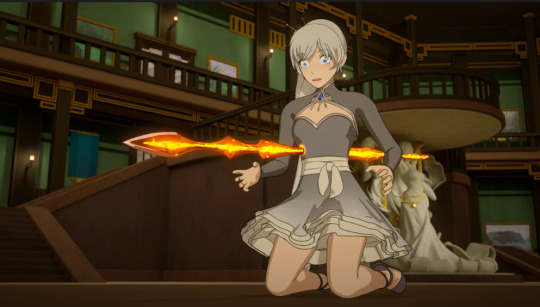
As I also mentioned previously, Jaune then plays the role of the Prince to Weiss’s Snow White (which is an alchemical fairy tale). Like when Ren unlocks his aura to protect Nora, Jaune unlocks his to save Weiss. Weiss looks as if she is in a glass coffin that gets more and more golden, symbolic of refinement.
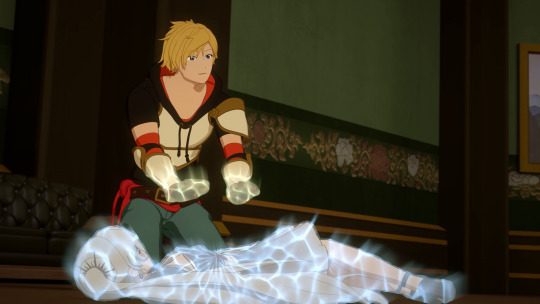
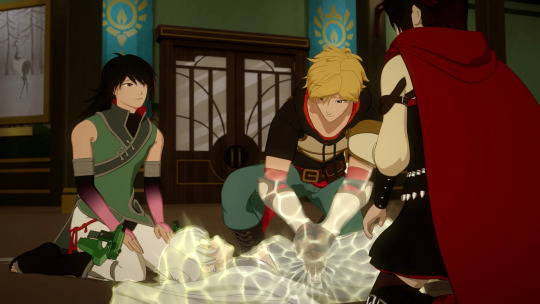
It’s also probably an allusion to this image of a chemical wedding presided over by Saturn (Mercury in this scene, since he’s there) and Death (Ruby and Qrow, who are also present in the scene with Jaune and Weiss). (For more on this image, see here.)
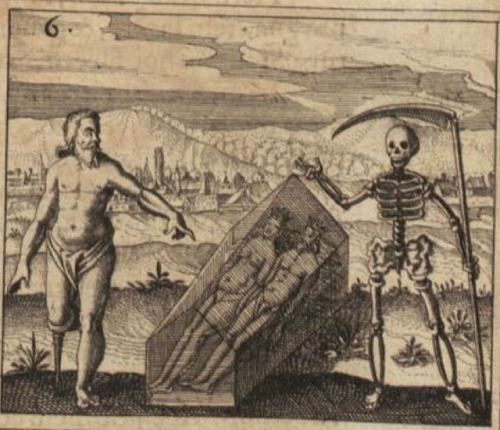
Weiss and Jaune also have some oppositional imagery and arcs: Weiss starts Beacon with a deep family legacy and an inherited semblance, she chooses to go to Beacon on her own and is the favored child (at first). Jaune too has a family legacy of warriors, but instead of feeling empowered because of this, he is insecure and literally cheats his way into the school. He doesn’t have a semblance until season 5. After this incident, Weiss and Jaune spend some time recreationally together (seeing a movie in vol 7); Jaune becomes more confident as a leader, and Weiss continues her arc in becoming more sympathetic to those from less privileged backgrounds.
Arguably, what happened at the end of volume 8 could be seen as having some symbolism of a chemical wedding for Weiss and Jaune too, but I don’t think it actually is one since they weren’t focused on as characters enough (if this was intended to be the start of one, we’ll get something next season, I’d imagine). The only reason I’m mentioning it is because it does function as an inverse of the previous one, which is the case for Renora and Bumbleby’s first and second weddings too. Cinder again almost kills Weiss (she falls in the exact same position as in vol 5), but Jaune saves Weiss when he screams after killing Penny. Instead of saving Weiss by healing, he kills. There’s also some distinctive red and white imagery.
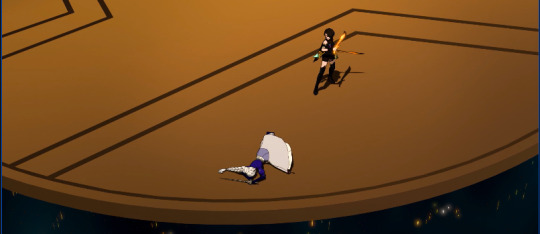
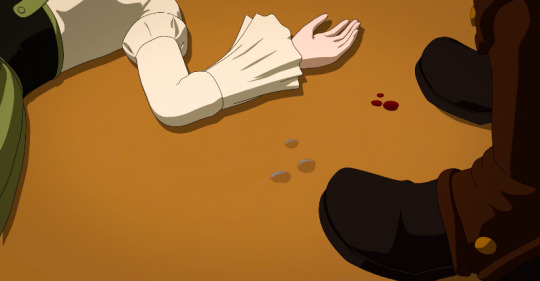
And then Winter arrives with a six-pointed star and birds before telling them to run together:
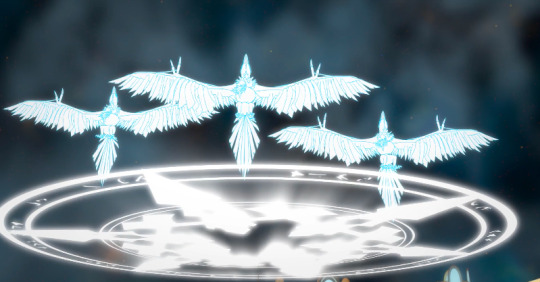
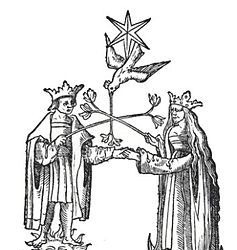
But again, I wouldn’t really call this one; it just has some imagery of one and fits a pattern, so I’m including it as a potential lead-in to an actual one in the void or later.
Ruby Rose/Oscar Pine (Rosegarden)
Like with Weiss/Jaune, I’ll be arguing a little bit about why I think this one is likely to end up romantic, too (for example, Cinder most recently in volume 8 used Oscar to taunt Ruby in a callback to using Pyrrha and Weiss to taunt Jaune).
Also: oh look, finally a wedding that isn’t violent. They just... meet. Which is also normal for a chemical wedding but less dramatic.
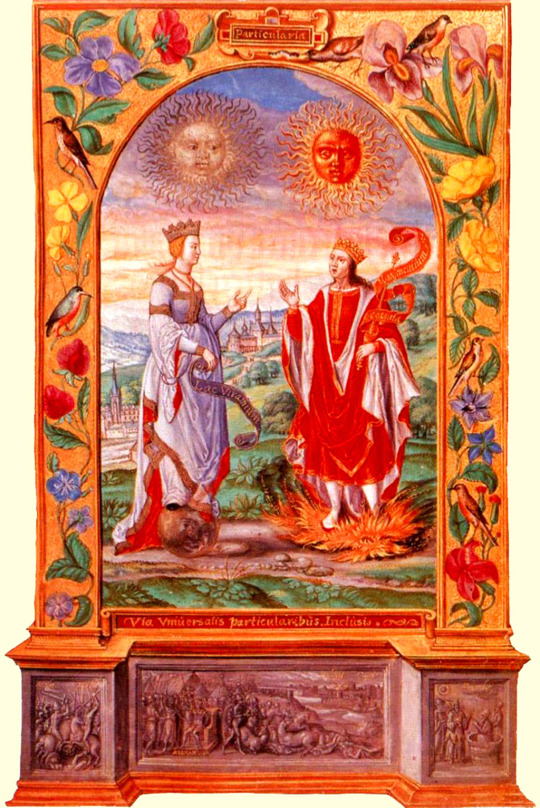
Behold, the bird uniting the solar king and lunar queen:

(Fun fact: unless CRWBY came up with ship names which I highly, highly doubt, this is pure coincidence, but it’s a funny one: the art series this image is taken from is called Rosarium Philosophorum--which literally means “rose garden philosophy.”)
Let’s look at the scene where Ruby and Oscar meet for the first time. What makes this a chemical wedding is in part how obvious their markings are and the overall imagery is in the scene.
They are united by Qrow (who in addition to being named after a bird can literally transform into a bird):
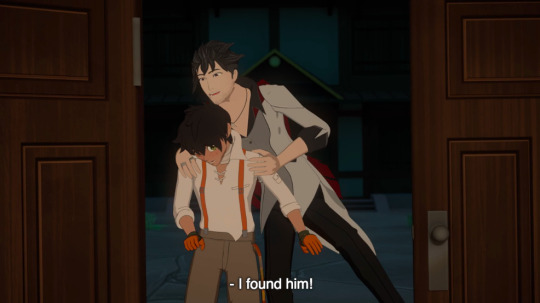
Oscar asks about Ruby specifically (yes, I know because Qrow’s her uncle, but the writing is telling us to focus on his relationship with her):
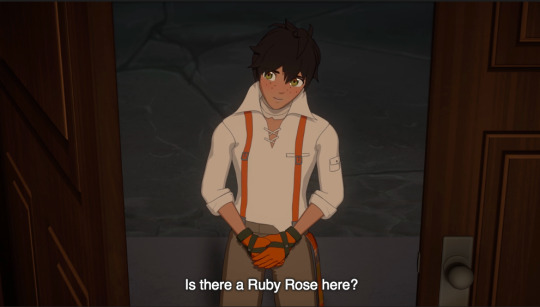
And immediately notes/is in awe that she has silver eyes (i.e. the moon):
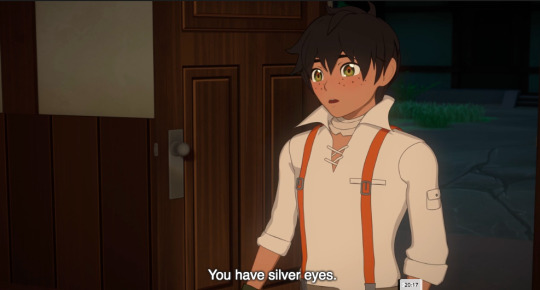
Qrow seems to realize he’s done something momentous in a way that almost doesn’t entirely work within the frame of the narrative (but he is drunk, so).
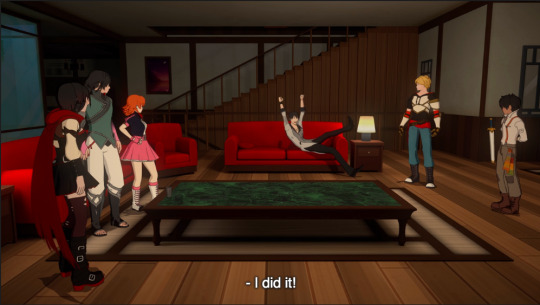
The scenery of this room is also telling. The table is literally an Emerald Table, the legendary foundation of alchemy itself.
Once they sit and talk, behind Oscar are the elements of earth and water, which he represents, and also the moon, which while traditionally associated with earth and water, he does not (at least not as strongly as he’s associated with the sun/gold):
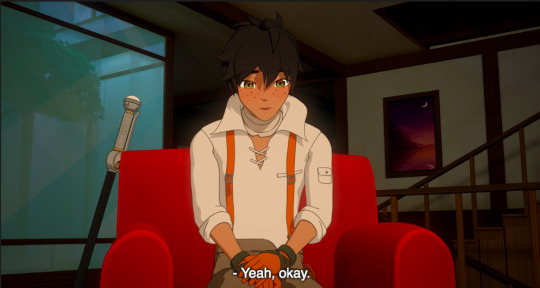
Similarly, behind Ruby we have the elements of fire and air (like, if you zoom in, they actually drew air), which she is marked as, and the sun, which again, she’s not as strongly associated with as she is with the moon:
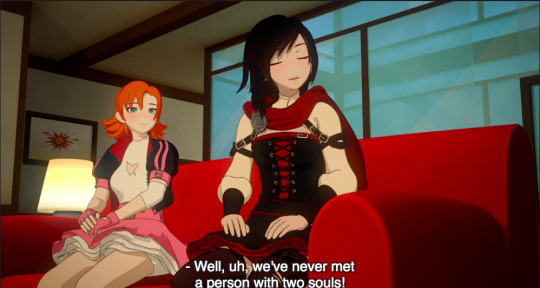
In Splendor Solis, which CRWBY has referenced before, the Solar King does eventually end up grounded in the moon, and likewise the Lunar Queen in the sun:
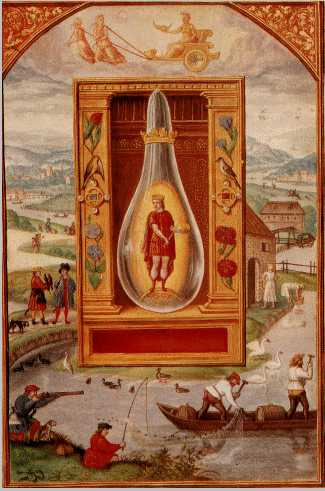
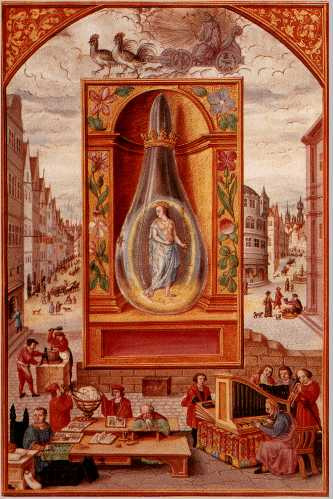
Oscar and Ruby also do have oppositional arcs and roles: Ruby starts the series in the very first episode by being invited to Beacon two years early because of her leaping into action to stop Torchwick. She’s scolded for her recklessness, but immediately picked out as special because of her silver eyes. In contrast, Oscar is reluctant to leave his farm once Ozpin inhabits him; he refuses at first, and then once he does leave, is nervous and timid.
Anyways I wouldn’t be surprised if Qrow arrives in Vacuo with RWBYJ in tow and this time reunites Ruby with Oscar in an inverse. We’ll see.
I do want to say that I also see potential for Emerald Sustrai/Mercury Black, in that they often act as one and share a theme song, but I haven’t seen any actual visual references to a chemical wedding for them... yet.
#rwby meta#rwby theory#rwby volume eight#rwby vol 8#rwby volume 8#rwby volume 9#weiss schnee#jaune arc#ruby rose#blake belladonna#yang xiao long#lie ren#nora valkyrie#oscar pine#alchemy#rosegarden#bumbleby#renora#white knight
155 notes
·
View notes
Text
Cowboy Bebop, 2021 vs. 1998
I watched Netflix's Cowboy Bebop remake last week, and my reaction overall was that it was nice enough with a few strong elements; that it was obvious, even through the filter of a decades-later remake, how much the original had influenced pop culture during those decades; and that the whole thing felt curiously low-energy, lacking some indefinable "oomph" that would take it from interesting diversion to a world and a story that you could want to lose yourself in.
So I decided to watch the original anime (which was possibly Netflix's business plan from the start). Having done that, I have to amend my judgment of the remake a little. The new Cowboy Bebop isn't bad, and in a few crucial ways it vastly improves on the original. But it is wholly inessential, imitating where the original show innovated, and failing to make an argument for itself as its own entity. And to a certain extent, I think this comes down to a fear of what fans would do if the remake wasn't sufficiently reverent to the original.
The thing that makes the original Cowboy Bebop remarkable is first and foremost its style and worldbuilding. Which is where it has been most influential, with probably dozens of works drawing inspiration from it and carrying its influence in their DNA. So when the remake recreates the original's visuals and style almost exactly, it not only feels derivative of those later (but, to a Western audience, better-known) works, it also ends up feeling a bit camp. This is why, I think, there's been a lot of criticism of the remake as embarrassed by its source material, and trying to distance itself from it with a jokey tone. I don't think that's actually true (to put it another way, the original Bebop is frequently unserious about its setting and characters, and the remake tends to mimic that tone as it does so many other things). But the act of imitation in itself creates a distance, so that what was presented matter-of-factly in the original now feels like an effort, the show constantly calling attention to having "gotten it right".
On the other hand, the original Bebop's characters are probably where it's weakest. I don't just mean that the characters are thinly written, but that they're often unpleasant. Spike and Jet are casually misogynistic, nudity and sexual assault are treated with indifference, queer characters are used as the butts of jokes, and everything having to do with Faye is a toxic waste dump. The remake is better on almost every front. John Cho is simply inspired casting as Spike. He captures the original's vibe and deepens it, making it clear that Spike's detached coolness is masking great pain. The episode that flashes back to his old life perfectly conveys, with just a few subtle acting choices, how much the Spike that we've come to know is a wreckage of a person. Mustafa Shakir gets a pretty hackneyed backstory as Jet, but it still ends up creating a person where the original character often felt like a placeholder. And as for Faye, words can't even describe how much better Daniella Pineda's take on the character is, and how much more humanity this version of the show gives her. She not only gets to explore Faye's pain at having lost her past, but gets multiple showcases over the course of the season, including a queer romance and a great love-hate relationship with her fake mother. If you hate the new Bebop but haven't included an asterisk excluding the handling of Faye, I'm giving you the side-eye.
In themselves, however, these characters aren't original enough to make the new Bebop worthwhile in its own right. Which brings me to what I think was the biggest stumbling block when trying to remake this show, the storytelling. The original show was almost entirely episodic, with each episode having a different setting and tone and even switching between genres. There was barely any overarching story. And unfortunately, no one makes series like this anymore (unless you're a pure anthology series). You've got to have an overarching story, and no one seems to know how to write individual episodes as self-contained units that are compelling in their own right.
So when the time came to remake Cowboy Bebop, the production crew had to reinvent the show's storytelling from the ground up to suit modern trends, and the result is unsurprisingly a disaster. Individual episodes are slack and pointless, because you can tell nobody's heart was in it. Characters like Vicious and Julia are made into major planks of the season-long arc, even though they clearly can't support that weight. Worst of all, the entire season is shaped around their conflict with Spike, even though that's an incredibly hackneyed story that clearly can't support a whole show. And that's probably because the world of Cowboy Bebop doesn't lend itself to dramatic season-long arcs. There are a few things you could work with - the destruction of the Earth gate, the plot of the movie - but you'd have to massage them quite a bit to get a traditional science fiction adventure out of them, and the remake seems genuinely hesitant to go that far.
Which brings me to the real problem with the new Cowboy Bebop, which is that Firefly did it better eighteen years ago. And look, I know we're all over Joss Whedon, and I know that there's a lot of valid criticism of Firefly (in particular, its borrowing of Bebop's worldbuilding is pretty shallow and, in many places, clearly racist). But it grasped both the strengths and the limitations of the original show's storytelling perfectly, and made them its own in a way that I don't think television in 2021 is capable of anymore. It's not just that TV in 2003 was better at telling episodic stories. It's that Firefly was incandescently good at it, tossing out god-tier episodes of the type that most shows don't achieve until two or three seasons into their run within a few weeks of premiering. And at the same time it was able to find an overarching story within its world that was suitably exciting and high-stakes without feeling parachuted in. That's the level the new Cowboy Bebop needed to aim for, but even if it had reached it, Firefly would still have gotten there first.
So really, the problem with Cowboy Bebop is that it has no reason to exist. With the exception of the casting, it brings nothing new to the table what wasn't done better by either the original or the works it inspired. What needed to happen was for someone to sit down and cannibalize the original show, take the things that were bright and original about it and make something new from them. And that's the one thing the fandom would never have stood for.
19 notes
·
View notes
Text
LGBTQ Manga Review – Yuri Is My Job Vol. 1-5

Yuri is a genre deeply rooted in its history and traditions. Dating back over a century, many of the scenes and situations from early "Class S" literature still predominate Yuri titles today. Common elements include senpai-kohai relationships between a bright and cheerful younger girl and an older, more assertive upper-classman. The bonds between the two were not the romantic and sexual love of lesbian narratives, but more sate or "pure" relationships often devoid of lesbian identity or attraction. The presence of S elements ebbed and rose over the past century, but they experienced a surge at the end of the 20th century. Contemporary S literature dominated the Yuri scene for at least a decade, and even now, its effects are still seen in many works today.
Naturally, as with any genre that becomes too entrenched with tropes or clichés, Class S literature became the subject of parody, commentary, and deliberate defiance. And while numerous works have repeated, twisted, rejected, and exaggerated tropes, perhaps none have done so quite as masterfully or as enjoyably as Miman's Yuri Is My Job! The series uses S Yuri's ideas uniquely and masterfully weaves a narrative in and out of them with a layered setting and great characters. The constant balance between and integration of reference, humor, and a strong core narrative had me gleefully enthralled and thoughtfully pouring over every page. I ravenously consumed the series, not just because of the cute cakes and elegant young women, but because I was so invested in the story and intrigued by the manga's premise.

Breaking down every reference is far too daunting a task that frankly deserves its own dedicated article. Still, to briefly overview, Yuri Is My Job! is set primarily at a café themed after an all-girls mission school, Liebe Grils Academy. The servers of the café act as the elite students of the fictitious academy and offer outside visitors, patrons of the establishment, a glimpse into their forbidden world of elegance and sisterly love. The series follows high school student Hime after she starts working at Liebe after accidentally injuring the manager, Mai. The series takes off from there, with Hime participating in the various themed events and navigating challenging relationships with coworkers, including her hostile schwester, the upperclassman who mentors her, and, in the world of the café, partners her.
Yuri Is My Job! is much more enjoyable with an understanding of S literature and themes, as references can slip by readers otherwise. However, particularly after the first volume, the series opens up a little more with an overarching plot that dips in and out of the thematic S material. Even without a grasp of S tropes, readers can enjoy watching server Kanoko struggle with her hidden affection for Hime or get caught up in the excitement and scheming during a popularity competition between the staff.
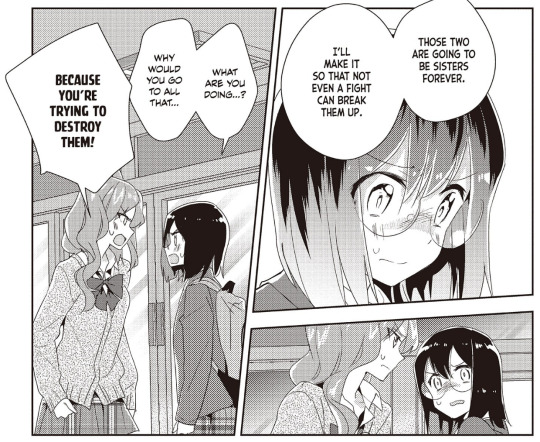
Throughout the first five volumes, multiple shorter narratives, such as the cook getting sick or Hime learning how to serve guests, are interwoven with the overarching character and relationship-driven story. Although almost every character has plenty of time to shine and distinguish themselves, the main plot revolves around three characters, Hime, Yano, and Kanoko.

Hime, the protagonist, maintains a constant facade of the sweet and beloved princess. However, her adorable and charming act is just that, and only two people in her life know her secret, Yano, and Kanoko. Inside the café, Yano acts as Hime's "onee-sama", holding her close and praising her to the delight of Liebe's patrons. However, she is terse and often angry with the girl, unable to move beyond a misunderstanding in their shared past and her insecurities about Hime's true feelings. Kanoko however, acts as a foil to Yano. She relishes Hime's facade, specifically in that she is one of the few privy to the truth, and harbors an attraction to her; she hides these feelings rather than wear them on her sleeve as Yano does. The dynamic between these three drives much of the "action" in the manga.

The more I read Yuri Is My Job! The more I was able to see and appreciate the distinct patterns of storytelling and how the main plot is woven between three layers. The first, and most prominent, is inside the café, in a world dominated by S tropes. Here, characters play politics and plot against each other using their performance and the audience's reaction. For example, thinking how they will get votes for themselves or others during a contest, or else Hime acting cute and loving around Yano, forcing her to return the affection to maintain their roles as schewstern. Outside the fictional world of the café, elements of the story alternate between more grounded drama and thematic moments featuring Yuri tropes. Miman beautifully navigates the relationship between the plot and the parody, weaving a delightful story in and out of different classic Yuri scenarios.
Miman matches this creative story and setting with excellent artwork. Character designs are distinctive and well constructed. So much, that when characters say something "off-screen", a small sketch of their eyes and mouth in the speech bubble is more than sufficient to identify the speaker. Of course, the robust and developed personalities also assist here, as most lines are easily attributable thanks to solid writing and strong personality. The art also features very creative paneling, with almost every page having an entirely different layout. However, the order is still easy to follow and reads naturally.
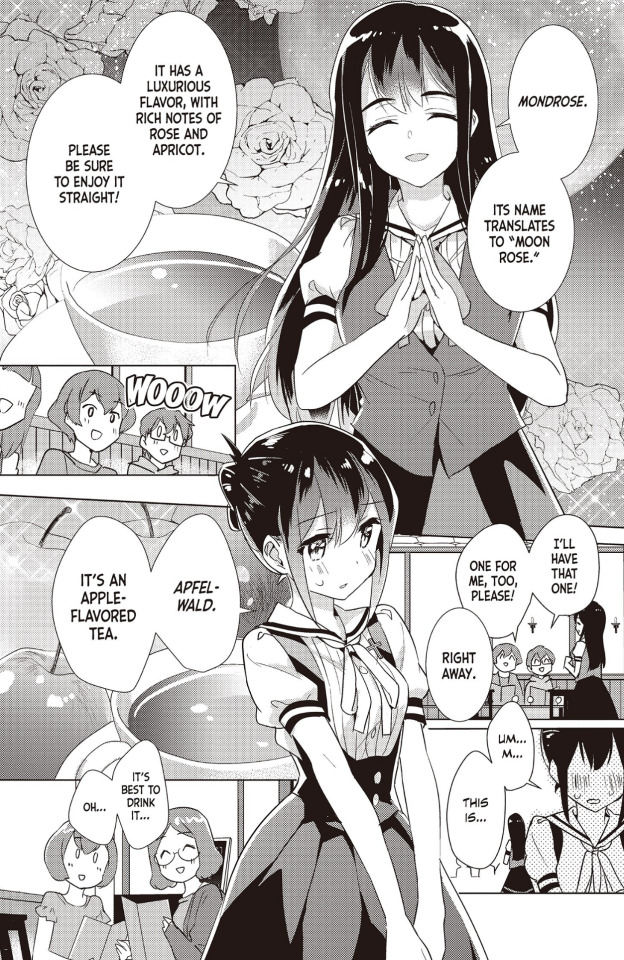
Not only is the art pleasing to look at, but it also adds to the manga's setting and parody of Yuri tropes. Panels feature the girls holding each other in dramatic and literally flowery poses, like a shot straight out of Strawberry Panic, complete with a backdrop of lilies. Appropriately, these fantasy-inspired poses occur in the café, often to the pleasure of adoring patrons screaming in celebration (thus mirroring my reactions). Like the other Yuri tropes, these artistic presentations occasionally jump outside of the café in more emotional or poignant moments. However, in a few crucial scenes, those more related to the narrative when it steps outside the boundaries of Class S, feature more grounded, although still dramatic, art. A particular shot in Volume 4 where Kanoko confides her hidden feelings to her senior, Sumika, and is comforted, sticks out in my mind just for this reason. It is a perfect example of art assisting the themes of the narrative and changing to suit the situation.

Yuri Is My Job! focuses mainly on Class S style storytelling, and thus, while it has plenty of traditional Yuri imagery, there is a starkly limited amount of lesbian content. Sure, readers can enjoy a decent number of illustrations featuring girls holding each other in a dramatic pose, but this is the act put on for the cafe, which is copying the "practice" relationships of S literature, themselves devoid of lesbian attraction. It is an imitation of an imitation, not queer content. Of course, this is by design, but it does mean that if readers want a grounded lesbian romance, they will find the series lacking. A bit of lesbian content does exist, Kanoko's crush on Hime exists outside the boundaries of work and S tropes, a relationship told in a flashback was, at least to one of the characters, "real," and there are signs of an eventual romance. However, the lack of lesbian identity should not be a reason to avoid this excellent manga.

Yuri Is My Job! is one of the most brilliant and exciting Yuri works out there. The ways Miman plays with the tropes and expectations of the genre are hilarious, complex, and exceptionally compelling. The characters are exciting and watching their stories weave through different classic Yuri scenes and tropes is as breathtaking as it is enjoyable. My sincere thanks to Diana Taylor, and Jennifer Skarupa and editor Haruko Hashimoto, for so deftly translating this series and preserving the S ties. I cannot wait to visit the students, or rather employees, of Liebe Girls Academy, in Volume 6.
Ratings:
Story – 10
Characters – 8
Art – 9
LGBTQ – 3 (Yuri 10)
Sexual Content – 1
Final – 9
Review copies provided by Kodansha Comics
Get Yuri Is My Job! digitally and in paperback today: https://amzn.to/3gNNeRt
Buying manga helps support developers and publishers. YuriMother makes a small commission off sales to help fund future content.
#yuri#lgbt#lgbtq#lgbtq+#queer#gay#romance#manga#art#reviews#yuri is my job#lesbian#shoujo#comics#literature#girls love#wlw
394 notes
·
View notes
Photo
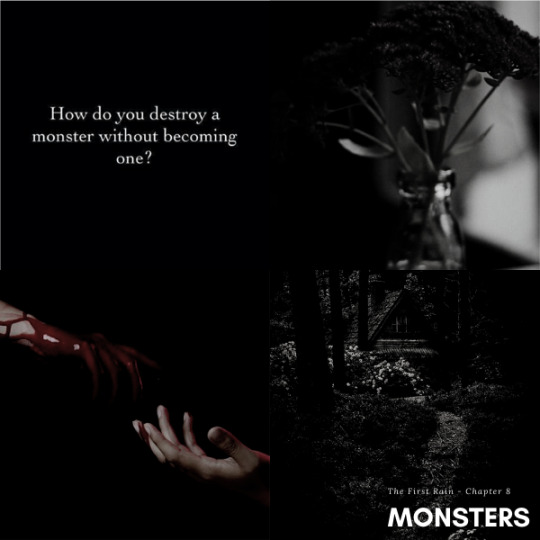
THE FIRST RAIN
[ CHAPTER EIGHT ]
Words: 29,726
Genre: Romance/Drama
Rated: Mature
Pairing: Alice + Jasper
Summary: What happened to Alice and Jasper when their paths first crossed in that stormy night in Philadelphia? What were the trails they rode in two years before joining the Cullen clan? It all began on that first rainy day, she had been waiting for him long enough, and he was finding what he had been blindly searching for.
READ ON AO3
The scent of moist grass bore the entire forest when the tempest inched down in the area their cabin was located; humming of birds an overpowering sound over the thin drops still falling from the trees. All was peaceful, so still and quiet after a storm. It was likewise the most vulnerable of times, for it was when predators struck.
Alice and Jasper, the deadliest two in those woods, sped through the trees side by side, tracking their prey. She located hers first, taking a turn Jasper wasn't anticipating. He understood she had to do her thing to quell the hunger hounding her ever since their conversation about the slip.
Jasper wasn't exactly hungry, but he followed Alice's advice and feeding anyway. Because he felt satiated—and on some level even stuffed with blood—he wasn't quartering all that effort. Jasper did snatch a bear that had been at clear range and fed from it until he couldn't anymore. Alice was a few meters from him, and he observed when she raced to another quarry, jumping a second creature.
He felt overwhelmed from the bear and sat to wait for his mate to finish up. While there, Jasper examined Alice in her element, ambushing the animal and snapping its head before she could feed from it. He considered how humane it was that she was killing it before feeding, so it wouldn't suffer. It made Jasper wonder if she had the same means when feeding from humans.
Alice would make an extraordinary hunter, in his opinion. For a vampire who had a forthcoming all on her own, misplaced in eternity, she grasped a lot. Had she been tutored, Alice would have made an impressive soldier as well—not that it was a fate Jasper coveted for her. Jasper desired to keep her away from any kind of confrontation.
Patrolling her so closely, that sweet angel she was, Jasper could understand all the appeal of spending immortality with that woman. Admittedly, he didn't quite see himself walking away from her—even in the brief time they had been together. But if there was something Jasper knew was that circumstances, and people, could change—particularly when one had eternity. He knew the emotions they shared were noble, serious, and real. Jasper had spent too long of a time in an uproar; he couldn't be positive of what that sublime sensation was. He'd been accustomed to different types of love; if this was it, there was still a lot to be determined about it. But then again, they had time—something humans lacked.
When Alice joined him, Jasper beamed, extending a hand for her to follow him at the top of the rock, overseeing the forest. She rested beside him silently.
"Only one bear?" Alice commented after a moment, noticing the animal not too far from them.
"I'm still feeling quite full," he explained with a faint smile.
"It's natural. When you begin feeling hungry again, we should positively hunt right away," Alice encouraged. The twist on Jasper's expression made her glare in more seriousness. "What is it?"
He shook his head, deciding to trail it off, but her eyes were resolute. "I'm still adjusting to the tang . It's nothing, honestly."
"It's different, I know." Alice pulled her legs up toward her chest, resting her chin on her knees as she contemplated the sky.
"Can I admit something?"
She deduced his eyes had been on her as she signed after shifting to find his gaze. Although Jasper assumed she knew, it came as a shock to Alice when he spoke. "I don't particularly enjoy the diet."
"Oh."
"I thought you would know." Jasper abruptly stared, baffled.
"Well, it's not so much of a decision but rather an inclination. I probably had no time to see if you only just decided to tell me," Alice explained, and he nodded, confirming her suspicion. "Why don't you like it?"
Jasper immediately sensed the sign of disappointment that Alice was striving to conceal from him. As they spent time together, she had been reading more and more into his gifts. Being an empath, Jasper had learned feelings weren't set in stone—like Alice's visions, they could change and be changed. The culmination between him and Maria had explicitly been how great she became on manipulating him. The contrast was his previous partner never sought to hide things to spare him, which he could tell was what Alice was doing now.
The idea of disappointing her troubled Jasper; he hesitated thinking about his response to that puzzle. "You have to admit it's distasteful, especially compared with what I've been used to."
Alice nods, to that much she could recognize. It wasn't as lascivious as drinking from humans, but she preferred it over the baggage that came with slaughter.
"And I did just feed from one or two," Jasper reminded.
"I guess you're not wrong."
"Yet, you're disappointed." Usually, he'd divert from the topic, but Jasper carried on. He cared about Alice; he desired things to strive between them. He had seen with eternity that it took effort for relationships to endure, not just physical attraction—to which they had in abundance.
"I'm not."
"Alice." He peered at her, brow raised and a delightful grin.
"I know, I know. You feel everything ." Her annoyed huffing told Jasper maybe Alice did want to escape the conversation, but he didn't cave. "I hoped this was more natural to you as it was for me. I'm not blaming you," she was quick to clarify, glancing up at him. "I don't relish on your suffering."
"I'm not."
Alice had difficulty hiding her shock.
"It does pain me when it's occurring, afterward not so much. It's our primary drive we're fighting against here, after all," he reminded her. Alice felt genuinely bothered this time, he missed the moment it had flipped, but he sure caught the emotion later.
Alice had to remind herself she was sentencing Jasper for a future him that she had seen, one that would not come to be if Alice kept ramming his boundaries. She knew the consequence of that; it wasn't a pleasant one. Her aid would be crucial to him and to them.
With that in mind and the wave of reassurance charging toward her, Alice gave Jasper a brief nod.
"I guess I pushed you too hard, too fast, I'm sorry," Alice said. He wasn't expecting an apology, so Jasper just signed. "Maybe we can come up with a different plan. If you still crave to feed from humans every other time, we could make the shift smoother."
"Looking the other way would upset you." Jasper didn't question; he somehow knew that to be inevitable. "That is the last thing I want to do."
"It wouldn't—Well, all right, maybe a little. But it would also help you, I can see it. And in the long run, that will be important," Alice explained as she sat up straight, hand stretching to hold his. "And that is all that I want, Jazz."
She had seen him through so much twinge, an avalanche of torturous agony, now Alice wished that he could have a more peaceful existence. Preferably by her side.
Back in the cabin, Alice busied with arranging the bedroom. She had seen the deliveries arrive in a few minutes, and having the area unblocked would have them out flying. It wasn't so much worry for Jasper being around them—as she planned to send him off when they arrived—Alice wanted to get this finished and fixed; their life ordered and following on track.
Jasper sat nearby, reading a book about the first war, when her eyes shot up and halted. He faded off her sight, and all too fast, Alice saw big and bloody eyes. She wasn't positive who they belonged to, but they were liquid fresh, glistering with death. It uttered her panic immediately, agonized over what Jasper was bound to do. Was she judging him, though? Alive thought to herself, h ow could she know it was him if all she'd seen were eyes, vivid and sharp red.
Squinting back to her senses, she focused on Jasper, now standing in front of her. A guarding arm around her and the other squeezing her hand. She vaguely caught his voice in the background, as if it calling her from a distance and not right next to her ear.
"What did you see?" he insisted. "Alice. What did you see?"
Alice understood his distress was over her alarm when he sent a surge of serenity toward her.
"It's nothing." Alice shook her head softly and fixed a smile over at Jasper, who frowned, unconvinced. "I'm not sure yet. It was a swift flash." That much was true. Alice had no notion what it implied or why it had shown up to her, but it did, and the concern was indisputable.
"Why did it disturb you so much?"
She lamented, inclining up to peck his lips. "Sometimes they simply do, don't agonize about it too much," Alice promises, and Jasper nods.
Resuming her clean up, Alice ventured to occupy Jasper's attention with small chatting. She had great ideas for their bedroom. The larger frame arriving would eat up some of the space, but Alice still wished to make it homey.
Jasper had joined in assisting her and proposed that they get rid of the nightstands—there wasn't really a point when they didn't truly sleep. He'd argued they could store the items there in the office next door, since he didn't actually have that many things to keep.
"We'll get you books and memorabilia and trinkets," Alice said sweetly, skipping to meet him on the other side of the room; her arms enveloped around his neck; nose nuzzling his cheek when he hoisted her off the floor.
"I don't need any of those." His tone was soft, planting a peck on her lips when he turned his face to her, praising the delicacy in her beauty. All he needed was there, his whole world.
"Well, there must be something we can get you, Major Whitlock." She grinned, smoothing her lips to his again.
"I did enjoy that game we played the other day."
"Chess?" Alice raised a brow, but she wasn't really surprised. She'd had many visions of Jasper and their future brother Emmett, both men sitting across from each other in a light and open living room, an elaborate game of chess in front of them.
"It's very strategic. I like the nature of it," Jasper explained and Alice nodded rapidly.
"We could get a nice set, something that—" Alice couldn't finish her words as another strong vision clouded her senses.
There were two bodies on the floor, looking lifeless, drained of all blood. The soft pink of the cheeks had disappeared to give place to a mauve, almost pale purple on their faces. The two men had their throats completely dilacerated, the only last specks that remained of blood smeared across their necks.
A sloppy affair, the way their flesh had been pierced. Positively done by someone with greed and lack of control—almost as a feral newborn damage in their naive frenzy. It was gruesome; the desperation petrified in their eyes said too much of the pain they had endured.
Alice felt hunger in her vision, of whoever had done it. The intensity of the emotion so palpable felt almost as if it was her own.
Her eyes shifted from the bodies to the shadow standing out the light, but before she could discern the face of the predator, she was back to her senses.
"Alice." Jasper was shaking her now—because he didn't think she could get more startled and pale, but it seemed the nightmare drained the rest of life off her. When he was so worried, it was arduous to stay focused and not wave all his concern, and she slumped in the feeling of his fear for a second, for she too was in thorough desperation.
"What's happening, Alice?" He yanked back the worry to expand tranquillity, and Alice was finally able to breathe, staring at him with a frown.
"I saw two men… Dead… Here." She was working to make up what had happened and how it occurred.
Jasper was about to protest and hold her back in the present, but her eyes drifted off again in search of answers.
"Tell me, what do you see?" He directed this time, an arm still clutching her steady, and his emotions still flooding sheer peace.
Alice focused.
The men were nothing but a pile of flesh now, on top of each other, tossed there already dead. A figure crawled in the corner, but it was too dark; she couldn't see their face. Instead, she searched the men, inspected their faces.
"They're older…" She whispered quietly, eyes still on the sight.
"Very well. Do we know them?"
"I can't tell—"
She couldn't see them too well, their frightened petrification and mutilation of the throats making them look disfigured, nearly unrecognizable. Alice inspected the wounds closely. They seemed different, like they had been done by various vampires—or at separate times.
"The bites are different. One is bigger, sloppier," she told him.
"What else is there?" Jasper continued to guide her through, his fingers smoothing down her spine as other relaxing strings caught her perfectly.
Alice could sense the headache building, having to seek for the minor details in a vision that felt so terrifying. She stared closer at the bodies, trying to get any evidence of who they could be. Then a voice, in the vision, hindered her investigation.
"We have to go, we must leave," a female voice called out.
"We'll deal with this," the male voice sounded firm. When Alice peered around for the source, she saw it coming from outside. Like a voyer of the conversation, Alice approached the front door with care—as if the people in the vision could see her.
There was a vase, one of her favorite, shattered near the door, and a pool of blood. She assumed the source of it all, working to resolve the puzzle.
"Last time, nothing happened," the man said.
"Not this time."
"What have you seen, Alice?"
She saw herself and Jasper outside, both with their backs to the door, where she watched the vision roll out.
"Please trust me, we can't stay, Jazz. At least not for long."
"We'll fix this. I'm sorry—"
"Don't. It's all right."
Alice allowed out a breath, looking at Jasper when the vision vanished, and she faded back.
"I think you killed them," she said with a lump on her throat.
Jasper drew back almost instantly, and she felt the pain dripping from him. Desperate to comfort him, Alice reached out for his hand, not allowing Jasper to get distant now. It hadn't happened, and she always believed things could be prevented—even when the vision looked so solid.
"Jazz."
"Perhaps I should go."
"No!" Alice pleaded, tugging him toward her. He reacted to her need for his presence, steadily sinking into her pull with a nod. He wouldn't go; he wanted to stay and not kill . "Maybe we can still change it."
Jasper agreed, waiting for her frown to relax. Alice searched the visions again, looking back into the images that had shown up, for details she could have missed; his hands were on her again, soothing and protecting.
"Tell me what you find," Jasper encouraged quietly into her ear.
Jasper pulled back from her and nodded, briefly leaning in to peck her forehead.
"I'll be out back," he proposed encouragingly. He would be far, but just enough so that he could calm her down still. Jasper was gone in seconds. Alice strolled to the door, opening to greet the two men with the brightest smile, feeling the waves Jasper was still conveying her way.
"Good afternoon, Miss," one of the men, the one that had aided her at the store, greeted. He bowed softly, still clearly mesmerized by her appearances, like all people were. The other one, a taller guy with not much of a patience, smiled briefly but also did give Alice a second look.
"Afternoon," Alice inclined her head briefly and made space for the frame.
"Where should we put it?"
The men eyed the narrow steps with painful gazes and Alice swung her head instantly. She wanted them out of there as fast as possible anyhow.
"You may leave it here. My husband can get it upstairs later. We're still fixing some things there," Alice explained casually.
They were quick to nod, and the taller one handed Alice a paper to sign. She scribbled far too quickly, not minding it too much. Alice turned around on her ankles after she was given a copy and the movement accidentally knocked down a vase. Typically she would have sped to save it, but in the humans' presence, she let the object drop to the floor and shred to pieces.
She came back too quickly with a gasp and looked up at Jasper.
"It's the delivery!"
On queue, the doorbell rang on their house, and Alice watched, helplessly, the entire vision unfold in her mind just a millisecond before it all occurred.
Everything happened extremely fast. The smaller guy reached for the vase pieces and so did Alice.
"Oh please, don't worry about that." Alice dismissed, attempting to collect the remains on her own, but the man was persistent.
"It's all right, Miss!"
In a very brief second, he captured a crack with too much enthusiasm, unbeknownst to him that his excitement to help would be his downfall. The cut was deep enough to quickly pool blood on his hand; for Alice's eyes to grow black just as fast. The animal in her awoke and all the delicacy and the self-restraint in her wouldn't be enough to hold it back—like that time she had murdered her work friend or the time before where a late night walker didn't stand a chance.
She wasn't Alice anymore. She was nothing but a vampire—eager for human blood—when she snapped the short man's neck, and her teeth carved his jugular. The warmth of the blood undertook her entire body, satisfying a thirst of far too long . When her eyes opened up again, they darted up to the taller man, abruptly terrified by the turn of events. He would scream, but Jasper emerged in front of him before Alice could reach her next pray.
The feral beast hissed at her mate.
"I'll take him, the other is still alive and he'll turn if you don't finish him," Jasper said coldly, strategic. Only then Alice grew aware of the grunts of agony.
She briefly saw Jasper snap the other man out before she returned to her victim.
When there was no more life to down, Alice stood up, mouth dripping with blood and her eyes two piercing rubies.
#jalice#alice cullen#jasper hale#twilight#twilight fanfiction#twilight renaissance#the twilight renaissance#mary alice brandon#jasper whitlock#mine#the first rain#fanfic
29 notes
·
View notes
Text
SIR GAWAİN AND THE GREEN KNİGHT
Do you enjoy reading about knights? The Sir Gawain and the Green Knight written by Gawain Poet can then delight you. This narrative satisfies the reader on two levels: historically and epically. If you are interested in knights, this fourteenth-century work produced in London, which could not completely flourish socially, politically, economically, or aesthetically, can be a surprise work for you. Now let look at what Sir Gawain and the Green Knight are, what their personalities and events are in poetry, and what their significance is in English literature.
This work, which has a poetic structure, is about chivalry, sexual seduction, and charm. One of the episodes set in King Arthur's court is told in the poem. While King Arthur's soldiers were eating at a table, the Green Knight approached and asked, "Who among you has the bravery to battle with me?" Sir Gawain responds without hesitation, "I am." So, Sir Gawain walks for days and continues towards the place where the duel will take place and enters a castle. A man and his wife live together in the castle, and the man says that the only condition for Sir Gawain's stay here is to give him daily things, and he accepts him to his castle. His wife tries to seduce Sir Gawain and gives him a kiss, but Sir Gawain can't accept it. The man, befriends Sir Gawain and kisses him before he preys on him. The next day his wife comes back and kisses Sir Gawain twice. He comes back the next day and kisses her 3 times and she gives him a girdle and she says this girdle will protect him. and when the day of the Duel comes, the green knight and Sir Gawain fight. The green knight cuts Sir Gawain's neck not too deep, and finally the green knight confesses to Sir Gawain that he is the man in the castle. The wife's kisses and the girdle tell him that Sir Gawain's loyalty is to test him Sir Gawain is disappointed and embarrassed as a knight. When he returns, he sees that everyone is wearing green. This poem, which has a mixed form, is written using alliteration, and also a short half-line consisting of only two syllables in each stanza is one of the elements that make up the metric form poem called 'bob and wheel'. Courtesy rules are one of the most important themes. It highlights what a knight's loyalty and devotion should be like, and what happens if he puts his honour aside and falls for his feelings. Sir Gawain's timidity and wickedness are symbolized by the green girdle in the narrative. The green girdle he wore because he felt it would protect him lacked such a characteristic, and the fact that the wife of the guy he lives with seduces him is practically a mark of humiliation. The changing of seasons in the poem's chapters 2 and 4 mirrors Sir Gawain's inner state. The transition from bright and fresh air to dark and chilly weather demonstrates that he is a thinker with his psychology. He transforms from a happy, confident, and proud knight to a timid, servile, and disloyal knight in an instant.
So why is it so important to English literature? Because the poem Sir Gawain and the green knight is written in the Old English dialect but has the title of masterpiece over the years. While other poems keep the subject of Christianity in the center, this poem does not. This poem written with a long group of alliterative linesis an example of medieval romance and dramatically depicts the hero's loyalty and chastity. Morgan le Faye's legendary hate of Arthur and his palace known as Camelot frames the storyline. Morgan, Arthur's half-sister and a strong sorceress, frequently appears in legend as the Round Table's adversary. Indeed, medieval readers were aware of Morgan's part in the destiny of Camelot, the idyllic paradise portrayed in Sir Gawain and the Green Knight. The poem's second frame is a historical frame. The poem begins and concludes with a reference to the tale of Britain's descent from the ancient city of Troy by the road of Brutus, Troy's founder. These connections link Arthurian romanticism to Rome, which is anchored in an earlier and higher literary heritage than the courtly tradition, and fourteenth-century England, which was also established by a Trojan horse. The word romance does not just fit with the word love. In this poem, romance is famous for the processing of different emotional bonds, for example, honour instead of love, pride instead of fame and modesty instead of arrogance are at the forefront. all of these are handled under the theme of romance with an emotional cry. Theories abound as to whether the legend of King Arthur was true, and poems like these may have been written to prove it. Although the tale of chivalry is the main theme in the poem, King Arthur and Camelot are frequently mentioned. It is also crucial in trip and quest narratives that the hero eventually returns home or continues on his adventure. If he returns home, you will have the steadiness and sense of fulfilment that comes with completing a full circle. If the hero continues on with his life, the tale becomes ambiguous, with the promise of a sequel. A trip or mission must attempt to understand what the protagonist seeks beyond reality, as well as what his return or continuance signifies. Here's another useful indication: The desire for self-knowledge is a recurring element in almost all journey and quest narratives. This journey is an opportunity for Sir Gawain for an inner search. What is wanted to be told is not how he overcame the obstacles on his way and his heroism, but how well he knows himself, how he knows himself, and his self-respect.
These moments of Sir Gawain are both a lesson and a critique, and this poem was written with a romantic effect. The inner conflict of the character, respect and honour are the most important parts. The green girdle and kiss given is a symbol of infidelity and cowardice. The table around which Arthur's men gather represents loyalty to the master. And the green knight becomes Sir Gawain's greatest teacher, as a man who measures self-kindness, dignity and chastity. In fact, literature is also a lesson given to people to explain this journey, and therefore the lessons that should be given to humanity were formed by poems and books, and this poem may well have been written as an intermediary. Sir Gawain and the green knight, which sounds like a simple knight tale, may actually be a guide. Sir Gawain and the poet of the green knight wanted to make a reference to antiquity by combining the country legend with literary and historical forms. The poet especially wants to draw attention to the Arthurian epic and the Roman Empire by associating the Arthurian romance and Troy.
-Tanzmitmirsblog
#sir gawain#the green knight#stories#essay writing#writing#my writing#newpost#medievalliterature#literary#english literature#writer#reading#read#books & libraries#poets#poetry#writersnetwork
5 notes
·
View notes
Text
My Love From The Star Final Review
Cast: Jun Ji Hyun, Kim Soo Hyun, Park Hae Jin, Yoo In-na, Shin Sung Rok, and Kim Chang Wan
Year: 2013
Channel: SBS
Streaming Service: Rakuten Viki
Rating: 9.0/10.0
My Love From The Star revolves around the life of Do Min Joon, an alien who has spent the past four decades living in South Korea and Cheon Song Yi, a Hallyu starlet, who also happens to be Do Min Joon’s neighbor. Hilarity, romance, and chaos ensues when Do Min Joon and Cheon Song Yi embark on a rollercoaster ride relationship during the last three months of Do Min Joon’s stay on Earth.
My Love FromThe Star was a drama that I briefly watched the first episode in 2015, but did not continue the show for some reason. However, after watching the show again almost half a decade later, I can understand why this show was so fundamental for creating the Hallyu wave and the love for k-dramas internationally. My Love From The Star has a little bit of everything for everyone. It has elements of romantic comedy, tragedy, crime thriller, sci-fi, and even bits of historical drama here and there. Let’s also not forget the psychology lectures from our very own Professor Do Min Joon. Heck the show even has elements to it that resemble the mockumentary style that we see in shows like The Office. Another amazing aspect of the show is the phenomenal cast. You have Jun Ji Hyun, who was at the peak of her career when this series aired, and she scores a home-run with how perfectly she played the hilariously sassy and ditzy starlet. She does a fine job also in portraying the range of emotions that come from Cheon Song Yi, whether it be her unleashing everyone’s inner drama queen, or moments of profound vulnerability and naïveté from a young woman, whose been in the taxing and image conscious Korean entertainment industry. Kim Soo Hyun also does an amazing job in playing the no nonsense stoic yet caring 400+ year old alien. The show also boasts an amazing supporting cast and this is one of the few dramas that truly succeeded in its ability to give ample screen-time and side plots to its supporting characters. Its no surprise that this drama was the launchpad for many of the successful Hallyu stars that we see today such as Yoo In Na ( Goblin) and Park Hae Jin ( Cheese in the Trap and Forest).
One thing that this drama truly nails is its humor and the cat and mouse chase between the antagonist and all the other characters in its drama. Its also a drama that does a fine job in straddling the line between what we would consider a soap opera and what is not. Cheon Song Yi’s outspokeness was probably a breath of fresh air for a k-drama that aired in 2013 and it probably paved the way for many of the strong female kdrama characters that we see today. However, My Love From The Star, is still a man’s world. Only the men get involved in the dirty business of chasing down the villain and the women, even Cheon Song Yi, become hopeless victims and spectators. For the sake of romance, we start to see women compromise their individuality for the dependency needed to create “fluff”. Additionally, the 21 episode length of My Love From The Star made me realize why it is so crucial that k-dramas only operate on a sixteen episode format. 21 episodes is simply too long for this show and too much of the plot gets dragged on at times to create a show that can last 21 episodes.
Also, I would like to point out that while the romance between Cheon Song Yi and Do Min Joon was very apparent through the banter that they share, I’m not entirely convinced that Kim Soo Hyun and Jun Ji Hyun’s acting truly exemplified the chemistry needed to elevate this drama to the next level. For me, chemistry is more in the subtlety and unspoken than it is in open verbal declarations of love and care. Chemistry is when you see two people looking at each other and as an observer, you get goosebumps. You are convinced that two people are in love with each other simply from the way that they look at each other. I really felt like this was lacking at times between Kim Soo Hyun and Jun Ji Hyun, especially when you see Kim Soo Hyun and Seo Ye Ji’s acting in It’s Okay To Not Be Okay. For me, this signals that Kim Soo Hyun has either become a better actor in the past seven years, or that #hyunji is real???? Also, can we all just take the time to acknowledge that Kim Soo Hyun might be an actual alien. Man really looks hotter and younger now then when he acted in this drama, which is actually crazy. Regardless, for any k-drama fan, My Love From The Star is a rite of passage that everyone must embark on.



#my love from the star#kim soo hyun#jun ji hyun#sbs#kdrama#review#do min joon#cheon song yi#hyunji#hallyu wave#yoo in na#park hae jin
9 notes
·
View notes
Text
After we collided was worse than After don’t @me
I have thoughts on this movie and Id like to share. Read if you want or don’t. This is a rant, so if you don’t want to hear any negative thoughts on this movie, this is your warning!
You may or may not agree what I have to say, and thats okay. Im just sharing personal thoughts
-------------------------------------------------------------------------------------------
After We Collided, in my opinion, was a fucking dumpster fire, I honestly wonder how and why this franchise can still produce movies. I know I'm going to get some heat from this, but in all seriousness, I have no hope for the other films. I think I lost all hope for the franchise after watching this movie.
I read After in conjunction with the first movie. I was interested in how a fanfiction on Wattpad turned into a best selling book and eventually became a major motion picture. That's what sparked my interest in the franchise. Because I in my "teenage youth" read fanfiction and had heard of this particular fanfiction a few times, I wanted to finally see what it was all about. Not surprisingly, it was exactly what I thought it was, a fanfiction.
I did not like the books personally. There were many problems in content/ subject matter and execution of that content that I felt was poorly handled and sent out the wrong message to people at times, but that's for another post.
So going into After we collided, I didn't know what to expect, id watched After, id read the book, and seen promo and trailers and interviews; I knew that the rating had changed. After was rated pg-13 and After we collided is rated R. I knew, along with that, that there were talks about bringing in more book character elements like making movie Hardin more like book Hardin. I was skeptical about that because:
1. That specific change seemed really hard to pull off, especially when you've already introduced the character with different behaviors. I think the transition would have been better if they were more developmental and progressed over time instead of just happening.
and
2. I didn't like book Hardin, I much rather preferred 1st movie Hardin, and his character in the books is a lot, and I was skeptical of the actor to be able to step into that role; after having watched the first movie, which was a watered-down, version of Hardin
In my opinion, it wasn't his acting ability that was lacking in character presence. It was the way his character was written in the script. Book to movie adaptations are really hard, but they're even harder when you have to go back and undo and exchange parts/ feelings/ emotions of a character. The actor who played Hardin (who I'm not naming on purpose) seemed like he was not vibing with this version of his character whatsoever, making the movie so hard to watch. This extends to Tessa as well. Her character development changed, ill say, drastically, and I would have liked to see a smoother transition to that character that we started the movie off with. As an audience member, I was so disconnected from her character and anything that she did because I just didn't believe her character would do that. Being late and cussing in the lobby of her new job, and acting frantic, especially coming off of the first movie where her character acted completely different. I would have never expected her character to do any of that. What's worse about it is that it just happens. There is no explanation as to why it happens and why she does these things, or why she's become more aggressive, she just is, and that bothered me.
Another thing that bothered me to no end was this movie's lack of plot. The book series is very episodic and goes around in circles. I can accept that about the series because knowing the series's backstory that made sense to me. However, a movie should never be like that. There was no overall arching storyline. It was just a bunch of scenes from the book put together to get to the end, which is the "big" but not so big reveal. I felt like there was really no purpose to drive the movie; the goal was just to get from start to finish. This was really sad as a viewer
because there were moments where I felt like the writers could have capitalized on the storyline and made some more diverse and complex scenes that could have given the movie some color. The scenes really do go from one to the other with little to no connection, and they make absolutely no sense.
I think the worst thing for me in the movie is when Tessa goes home. Noah accidentally tells her that her Dad is looking for her. Tessa has this very curt conversation with her mother, and then it's never really talked about after that. Tessa's Dad becomes a vital part of Tessa's story. And I ask, why was that not capitalized on more in this movie? They kind of waited to put back in at the end of the film, which I felt was such a mistake. Like, I know they're saving it for the next movie. Still, I saw no reason not to capitalize on it while they were already setting up for the storyline in this movie.
The writers were trying to capitalize on it being sexier and more like the book that they forget to add a plot. There was so much material to work with. The writers could have easily written and rewritten the scenes to fit the movie's storyline. In return, I felt like that would help push the story along instead of it feeling like this needless pack of scenes.
In addition to that, as the audience, we are missing crucial information that would have helped make sense of the movie. Like we're missing the aftermath of the bet. Like they just scathe over that. The info on Tessa's father, which I see what they were trying to do, but I felt like no one really took the bait.
From a viewer's pov, assuming id never read the books, you start to wonder how this even came to be starting with the first shot.
1.Why is Hardin just asleep in his car?
2. How long has it been since the reveal of the bet?
3. Why and how is Vance able to whisk Tessa away to Seattle to a business deal that we only hear about after she's there?
That last one might be reaching, but still.....
And that's only within the first 15 minutes of the movie.
I also had pacing issues; this was a lot to unpack in such a short amount of time. Yeah, so......
Something I did like!
1. The exchanges between Trevor and Tessa seemed genuine. I liked the chemistry and how they're written together.
And that's pretty much it.
Despite my dislike of the movie, I can appreciate it for what it is a cringe romance fanfiction movie.
I will say overall, some stories should just not be made into movies. In my opinion, I believe the book lost a lot of value when you start adding real-life elements to it. Of course, everyone will have a preconceived idea of what the movie is going to look like. Still, I think expectations fall short when you can't execute the idea properly, which is what I believe happened with After we collided.
So that's my opinion. Just thoughts, like I said you can disagree with me and thats okay, but this this is just my opinion.
signed,
someone with thoughts
#after#after we collided [2020]#movie review#books#after series#hardin scott#tessa young#movie reaction#movienight#after we fell#before#after ever happy#fanfiction#wattpad
4 notes
·
View notes
Text
Notes on Robert McKee’s “Story” 21: How to Create a Great “Hook”
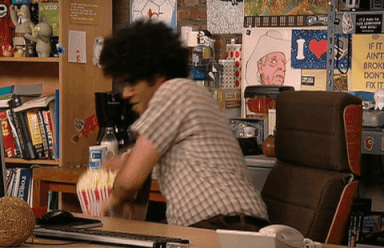
Today we’re going to delve into “the inciting incident.” You might also know it as “the hook.” It’s The Big Bang that kickstarts your story. Buckle up because this is an important (and slightly long) post.
The World of the Story
Before you start writing anything, you need to have a crystal clear idea of what your setting is. McKee talked extensively about setting earlier on in the book and I covered it in a post. I also created a World Building Questionnaire with over 100 questions to help you think deeply about your world before you begin writing. So I recommend that you check them out.
06 Setting and Avoiding Cliches
Questions to Help World Build
A couple more things you should consider about your setting are these:
“What are the biographies of my characters? From the day they were born to the opening scene, how has life shaped them?
What is the Backstory? “Backstory” is the set of significant events that occurred in the character’s past that the writer can use to build his story’s progressions. We landscape character biographies, planting them with events that become a garden we’ll harvest again and again.
What is my cast design? Each role must fit a purpose, and the first principle of cast design is polarization. Between the various roles we devise a network of contradictory attitudes. Ideally, each and every character would have a separate and distinctively different reaction to any given event, from something as trivial to a dropped glass to a death in the family. When characters act the same, you minimize the chance for conflict.”
The Inciting Incident
When you come up with your Premise (a.k.a. that spark of an idea that makes you want to write this new story), it doesn’t necessarily need to be the Inciting Incident. Maybe your Premise is the finale, or just a scene somewhere in the middle of the story that you need to build towards. So ask yourself: How do I set my story into action? Where do I place this crucial event?
Here are the necessary qualities of any Inciting Incident, as stated by McKee:
An Inciting Incident must be a dynamic, fully developed event, not something static or vague.
The Inciting Incident radically upsets the balance of forces in the protagonist’s life. Before the Inciting Incident, the protagonist is living a life that’s more or less in balance. But this incident radically upsets the balance, throwing it into either negative or positive.
In most cases, the Inciting Incident is a single event that either happens directly to the protagonist or is caused by the protagonist. He is immediately aware that life is out of balance for better or worse.
The protagonist must react to the Inciting Incident. Even inaction in and of itself is a reaction, though the protagonist cannot remain inactive forever, because there would be no plot otherwise.
The Inciting Incident arouses the protagonist’s desire/need to restore balance, and this leads them to determine an Object of Desire: something physical or situational or attitudinal that he feels he lacks or needs to put the ship of life on an even keel.
The Inciting Incident propels the protagonist into an active pursuit of this object or goal.
*Bonus* For those protagonists that we admire the most, the Inciting Incident arouses not only a conscious desire, but an unconscious one as well. these complex characters suffer intense inner battles because these two desires are in direct conflict with each other. No matter what the character consciously thinks he wants, the audience senses or realizes that deep inside he unconsciously wants the very opposite.
The Spine of the Story
The energy of the protagonist’s desire forms the critical element of design known as the Spine of the story (a.k.a. Through-line or Super-objective). It is the deep desire in and effort by the protagonist to restore the balance of life.
No matter what happens on the surface of the story, each scene, image, and word is ultimately an aspect of the Spine, related, casually or thematically, to this core of desire and action.
If the protagonist has no unconscious desire, then his conscious objective becomes the Spine. The Spine of any James Bond movie, for example, can be phrased as: To defeat the arch-villain. James has no unconscious desires.
If the protagonist has an unconscious desires, this becomes the Spine of the story. An unconscious desire is always more powerful and durable, with roots reaching to the protagonist’s innermost self. When an unconscious desire drives the story, it allows the writer to create a far more complex character who may repeatedly change his conscious desire.
By looking into the heart the protagonist and discovering his desire, you begin to see the arc of your story, the Quest on which the Inciting Incident sends him.
Design of the Inciting Incident
An Inciting Incident can be random, casual, coincidental, or on purpose. A wife could be the random victim of a mugging, inciting the husband to seek revenge. It could be on purpose, too: perhaps a child runs away from abusive parents.
While the the inciting incident for subplots do not have to unfold before the reader, the Inciting Incident of the Central Plot must be seen and felt directly by the reader for two key reasons:
When the audience experiences an Inciting Incident, the work’s Major Dramatic Question, a variation of “How will this turn out?” is provoked.
Witnessing the Inciting Incident projects an image of the Obligatory Scene into the audience’s imagination. The Obligatory Scene (a.k.a. Crisis) is an event the audience knows it must see before the story can end. This scene will bring the protagonist into a confrontation with the most powerful forces of antagonism in his quest, forces stirred to life by the Inciting Incident that will gather focus and strength through the course of the story. The scene is called “obligatory” because having teased the audience into anticipating this moment, the writer is obligated to keep his promise and show it to them.
Can you imagine the outrage you’d feel if you read all of the LotR books, all of them building up to destroying the ring, and instead of describing them casting it into the caldera, the book just cuts to them being back in the Shire and saying, “Man, it was hard but I’m sure glad we managed to get rid of the ring.” Fin.
Wouldn’t you just implode?
Locating the Inciting Incident

In other words, when should you insert the Inciting Incident? McKee’s book is about storytelling, but specifically through the medium of film. Therefore, he talks about this mostly in minutes. However, as writers, we need it in pages, chapters.
He states that the first major event of the Central Plot must occur within the first 25 percent of the telling, no matter the medium. However, the later the Inciting Incident, the higher risk you run of having your audience grow bored.
“Well okay, so I’ll just have the Inciting Incident happen in the first chapter and no worries,” you may be thinking.
For some stories, that is fine. But for others, you need to establish characters before the full impact of the Inciting Incident can be understood.
Take the movie Rocky, for example. Its Inciting Incident happens a full thirty minutes into the movie, when he agrees to fight Apollo Creed for the heavyweight championship of the world. In the thirty minutes leading up to that Inciting Incident, we are engaged by the subplot of his romance with Adrian, and we also learn more about who Rocky is, what an underdog he is--and it is thanks to our understanding of who Rocky Balboa is that the Inciting Incident is so gripping. “Oh my God, there’s no way in hell that Rocky can win! But I want him to win!” If the movie had started out with Rocky challenging Apollo, we would have thought it was just another wrestling match, with nothing at stake.
“Bring in the Central Plot’s Inciting Incident as soon as possible...but not until the moment is ripe.
An Inciting Incident must “hook” the audience, a deep and complete response. Their response must not only be emotional, but rational. This event must not only pull at audience’s feelings, but cause them to ask the Major Dramatic Question and imagine the Obligatory Scene. Therefore, the location of the Central Plot’s Inciting Incident is found in the answer to this question: How much does the audience need to know about the protagonist and his world to have a full response?
If it arrives too soon, the audience may be confused. If it arrives too late, the audience may be bored. The exact moment is found as much by feeling as by analysis.
If we writers have a common fault in design and placement of the Inciting Incident, it’s that we habitually delay the Central Plot while we pack our opening sequences with exposition. We consistently underestimate knowledge and life experience of the audience, laying out our characters and world with tedious details the filmgoer has already filled with common sense.”
A Caveat for Fanfiction Writers
Fanfiction is such a huge genre now, and as a long-time writer of it, I wanted to throw in my own two cents about Inciting Incident and fanfiction. Generally, we post our stories one chapter at a time, either scheduled or whenever we manage to get a chapter done. With fanfiction, it is my personal opinion that the Inciting Incident must be in the first chapter.
Even if you’re writing an AU, the readers will still know the characters and the barebones background information at least, so there is no need to build up who these people are, like in the above example of Rocky.
Because fanfiction is a free, nigh limitless commodity, readers are spoiled (myself included). If the first chapter doesn’t immediately pull them in, what incentive do they have to follow the story?
We’ve also seen this shift in music. It used to be that the “hook” of a song could come at the chorus or that BADASS solo halfway through the song. Scroll through your playlists and take a look--how many contemporary songs start off with the “hook?” I guarantee you it’s more than half. This is because in the age of streaming, we are no longer forced to listen to the entire song on the record or tape or radio. We can give a song a few second’s listen and skip it. Sadly, fanfiction is going down the same path.
The Quality of the Inciting Incident
“Henry James wrote brilliantly about story art in the prefaces to his novels, and once asked: ‘What, after all, is an event?’ An event, he said, could be as little as a woman putting her hand on the table and looking at you ‘that certain way.’ In the right context, just a gesture and a look could mean, ‘I’ll never see you again,’ or ‘I’ll love you forever’--a life broken or made.
The quality of the Inciting Incident (for that matter, any event) must be germane to the world, characters, and genre surrounding it. Once it’s conceived, the writer must concentrate on its function. Does the Inciting Incident radically upset the balance of forces in the protagonist’s life? Does it arouse in the protagonist the desire to restore balance? In a complex protagonist, does it also bring to life an unconscious desire that contradicts his conscious need? Does it launch the protagonist on a quest for his desire? Does it raise the Major Dramatic question in the mind of the audience? Does it project an image of the Obligatory Scene? If it does all of this, then it can be as little as a woman putting her hand on the table, looking at you 'that certain way.' "
Creating the Inciting Incident
Okay, so now you need to conceive and write the Inciting Incident. McKee states that the hardest part of any story to write is the Climax, but the second-hardest part is the Central Plot's Inciting Incident. This scene is re-written more than any other.
So before you begin penning the Inciting Incident, ask yourself these questions:
What is the worst possible thing that could happen to my protagonist? How could that turn out to be the best possible thing that could happen to him?
What's the best possible thing that could happen to my protagonist? How could it become the worst possible thing?
I wrote an absolutely horrible novel when I was 13. Now that I'm older and all-around better and more experienced in writing and life itself, I want to tear it all apart and rewrite it. The new inciting incident I have in mind currently is this:
Three years prior to the start of the story, the protagonist's mother vanished into thin air. She drove off to the store but never came back, and they found her car crashed down a ravine on the side of the road, but she was gone and the car had no blood in it. The protagonist's father locked himself into his study that night, and has not emerged from it since. The protagonist was 15 at the time, and in the three years that have passed since then she has grown independent. She lives in the house with her father, makes him meals and puts them on trays outside his study. Sometimes he takes them, other times he leaves them untouched. They have zero communication. In many ways, the protagonist feels like she lost not one but both of her parents in that accident.
Then, one day, she wakes up to get ready for school and sees that the study door is wide open for the first time in three years.
So now I have to ask myself the above two questions.
The worst possible thing that could happen to her is if her father has finally gone mad in his isolation and they are unable to restore their bond. How it could change for the best: She could commit him to a facility, allowing him to get professional help and allowing her to move on with her life.
The best possible thing that could happen to her is if her father emerges, sound of mind and body, and picks up his life with her again. How it could change for the worst: They both wish to reestablish an relationship, but an external force separates them, this time permanently.
“A story may turn more than one cycle of this pattern. What is the best? How could that become the worst? How could that reverse yet again into the protagonist's salvation? We stretch toward the 'bests' and 'worsts' because story--when it is art--is not about the middle ground of human experience.
The impact of the Inciting Incident creates our opportunity to reach the limits of life. It's a kind of explosion. No matter how subtle or direct, it must upset the status quo of the protagonist and jolt his life from its existing pattern, so that chaos invades the character's universe. Out of this upheaval, you must find, at Climax, a resolution, for better or worse, that rearranges this universe into a new order.”
Source: McKee, Robert. Story: Substance, Structure, Style, and the Principles of Screenwriting. York: Methuen, 1998. Print
#creative writing#creative writing methodology#creative writing theory#writing#writer#writeblr#write#author#writing inspiration#writing inspo#robert mckee#writing novels#writing fantasy#writing fiction#writing fanfiction#plotting#story plotting#novel plotting#writing prompts for friends notes on story
14 notes
·
View notes
Text
Holiday

Director George Cukor Stars Cary Grant, Katharine Hepburn, Doris Nolan USA 1938 Language English 1hr 35mins Black & white
Somewhat ill-at-ease mix of comedy and drama
I think this is a strange movie. I’m slightly hesitant because I wonder if that apparent strangeness is a less in the film itself and more in how it didn’t match my expectations. Let me explain: Cary Grant and Katharine Hepburn had just made the screwball masterpiece Bringing Up Baby together. A couple of years later, they would star in the great The Philadelphia Story, which like Holiday was directed by George Cukor from a script by Donald Ogden Stewart and adapted from a play by Phillip Barry. So Holiday should be full of fizzing verbal jousts and delightful silliness, right?
There’s certainly some of that. And that’s the movie that most of the time Grant seems to be starring in. Hepburn, though, is all dramatic over-intensity – her vision of what the film is seems very different. We’ll get back to that.

The story begins with Johnny Case (Grant) arriving back in New York from a skiing holiday. During the trip, he has met, fallen for and proposed to Julia Seton (Doris Nolan). One of the characteristics of a holiday romance, of course, is that those involved don’t know much about each other. So Johnny doesn’t know that Julia comes from an incredibly rich and powerful family. And Julia doesn’t know that Johnny has a plan for his life that isn’t in line with what she wants for him (and them).
But initially it all goes well – Johnny is warmly welcomed into the family by Julia’s sister Linda (Hepburn), who describes herself as the clan’s black sheep, and alcoholic brother Ned (Lew Ayres). Even their father (Henry Kolker), suspicious of Case’s lack of family connections, is impressed when he learns how well the once-impoverished orphan is doing on Wall Street.

Julia and Mr Seton are characters defined by what the plot needs them to do. The issue for the film is what it does with Johnny, Linda and less importantly Ned. Grant plays Johnny mostly as a blithe optimist who wears the years of struggle lightly. Ned could have been one of those cheery 1930s movie drunks but here he’s doomed and resigned to his fate – unable both to fulfil his father’s expectations and to actively reject them. And Linda? When we meet her she seems smart, sorted and self-aware, but as the film goes on she and other characters suggest she’s near crisis point, which hints that there have been problems before.

I started to feel that either Holiday is rich with subtext that doesn’t read clearly to a 21st-century audience, or it’s just vague. Are we meant to presume that Linda is one of those upper-class women who has been in and out of psychiatric care for much of her life? I was similarly frustrated about politics: Linda says she’s helped strikers, Johnny talks about ideas of the world he wants to explore, there’s almost an argument when the Seton’s obnoxious cousin complains about the government not being helpful enough to finance, but Linda’s intervention is cut off. Are Johnny and Linda meant to be just the kind of youthful idealists you get in any generation, or ardent New Dealers, or even potential Marxists?
None of that would be that important if this had been approached as a full-pace screwball comedy. But it tilts towards its theatrical origins – that feeling that everything has to be emotionally powerful you too often get in plays. That certainly seems to be where Hepburn is aiming.

(Further evidence of its theatrical roots: there’s only one exterior scene, and most of the film takes place in three medium rooms. The exception, the sole indulgence in the cinematic, is the vast hall of the Seton home, as seen in when an overwhelmed Johnny first steps foot in the mansion, and during a lavish party).
A mixture of comedy and drama is not a bad thing – indeed, I’d say it’s often a good thing. But in Holiday those elements work against each other: jokes are threatened by moodiness, suggestions of deep problems are shoved aside by romcom narrative conventions.
But that’s not to say Holiday isn’t fun. It’s a Cary Grant film from 1938 – of course you should watch it. When it chooses to be funny, it can be very funny. It just isn’t up there with his very best films, but then not much is.
[PS: A short while after I watched Holiday, I saw Crazy Rich Asians. Like Holiday, Crazy Rich Asians is a film in which the protagonist goes to meet the family of the person they intend to marry, and is shocked to learn that they are not just rich, but, well, crazy rich – magazine-front-cover wealthy, tilting-the-political-balance-of-power wealthy. And in both films, it is a crucial plot point that the main character is a super-bright, fast-rising person whose job is connected with the world of money: Wall Street broker in Holiday, teaching econ at an Ivy League college in Crazy Rich Asians. The difference is that Holiday has a set-up carefully designed to make it plausible that Johnny wouldn’t have got around to thinking about whether Julia was one of those Setons: they have only known each other for a couple of weeks, meeting at a ski resort away from the business world. Whereas Crazy Rich Asians, on the contrary, gives Rachel no excuse other than a rather bizarre lack of curiosity – has she never even looked at one of his buds-from-home’s Insta pages?]
11 notes
·
View notes